Jazz has top-50 world ranking back in his sights

Jazz Janewattananond’s return to form at the weekend will have seen him, and his huge army of fans in Asia, take a huge sigh of relief after a frustrating season so far.
His joint third finish in the Dubai Duty Free Irish Open stopped the bleeding on a poor run of results and will give him much needed confidence heading into the final quarter of the 2020 – which starts this week at the Aberdeen Standard Investments Scottish Open, followed next week by the BMW PGA Championship.
The Thai star came very close to winning the prestigious Irish event and held the lead on the back nine on Sunday at Galgorm Spa & Golf Resort in Northern Ireland. But he dropped shots on the inward stretch to finish three adrift of the winner and fellow Asian Tour member John Catlin from the United States.
Great being back on the @europeantour this week at #DDFIrishOpen ?? and being in contention on a Sunday! Next stop ??????? #seriousface #trustgolf @fashion1thailand #thisisboss https://t.co/gVgeygyO9P pic.twitter.com/ZWHTVLdDZv
— Jazz Janewattananond (@jazzjanegolf) September 27, 2020
Jazz also obviously benefited from having his regular caddie, Camp Pulit, back on the bag having missed his previous few tournaments.
The result also had a significant impact on his world ranking: he moved up from 65th position to 56th and put him back on course to try and better his best placing on the ranking, which was 38th position – which was the result of his brilliant 2019 season.
Getting back into the top-50 – which opens the door to playing in the biggest events in the game – is now well and truly in his sights.
Catlin, whose win in Ireland was his second on the European Tour in September, also enjoyed a significant shift up the ranking, moving from 138th to 84th.
Jazz had started the year on a massive high after winning four times last season en route to winning the Asian Tour Order of Merit title. And a third place finish in the SMBC Singapore Open in January suggested more was to come.
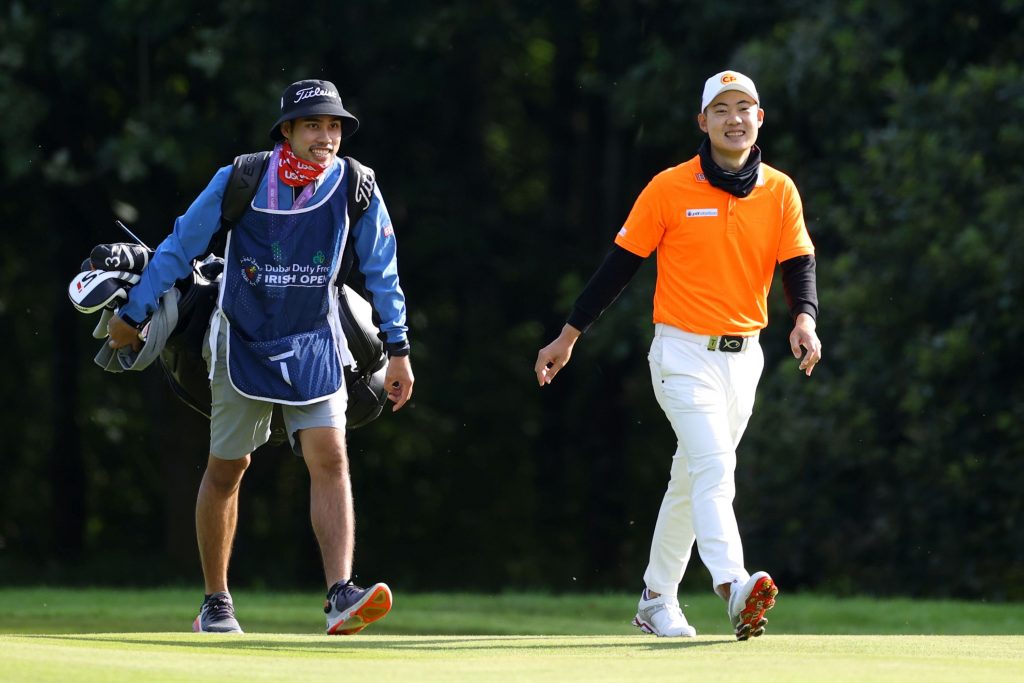
BALLYMENA, NORTHERN IRELAND – SEPTEMBER 27: Jazz Janewattananond of Thailand looks on with his caddie on the 6th hole during Day Four of the Dubai Duty Free Irish Open at Galgorm Spa & Golf Resort on September 27, 2020 in Ballymena, United Kingdom. (Photo by Richard Heathcote/Getty Images)
However, he then missed the cut in seven of the next 11 events he played in; which, in fairness to Jazz, was the result of a change of geographical location and, of course, the upheaval caused by the coronavirus pandemic.
He has been playing on the PGA Tour, through sponsor invites, and also competed in the US Open and US PGA Championship – the event where he famously finish jointed 14th last year.
He missed the cut in both the Majors and also in four out of the other six PGA Tour events he played – although he will have no doubt learned a great deal as he bids to join his countryman Kiradech Aphibarnrat as a full member of the lucrative circuit.
But it was not always a struggle for Jazz in the States.
After bumping into Sweden’s Daniel Chopra – a winner on both the Asian Tour and PGA Tour – at Bay Hill in the week leading up to the Arnold Palmer Invitational in March, the Swede invited Jazz to stay with his family and when lockdown hit because of COVID-19 on March 13, Chopra did not hesitate to invite Jazz and his caddie, Camp, back to his Orlando home to seek refuge.
Earlier in the year he also benefitted from a lesson with Tiger Woods’ putting coach.
After struggling on the greens, Jazz sought the advice of Matt Killen, whose star pupils include 82-time PGA Tour winner Woods and 2017 FedExCup champion, Justin Thomas. It also helped that Jazz is part of the same management stable as Woods and Thomas. Jazz flew to Nashville for a three-hour lesson with Killen.
Ends.

Imagine a golf course consisting of the most iconic and challenging holes on the Asian Tour.
A fictional hybrid-layout that features one of the region’s standout opening holes, one of the finest second holes and goes all the way through to an epic 18th.
A layout that would be the ultimate challenge – where breaking par is a monumental achievement.
Well, just such a virtual course now exists, as an Asian Tour panel of experts has selected the appropriate holes to make up what is the golf course of all golf courses in Asia.
With a par of 70 and length of 7,430 yards, we have appropriately named it The Asian Tour Monster.

To navigate us through The Asian Tour Monster, we asked players and experts to describe each hole – all of which have played key roles in many of the biggest tournaments on the Asian Tour.
Let us know what your think on our social media channels – Facebook, Instagram, Twitter.
Feature: The Asian Tour Monster – Front nine

Taiwan Golf and Country Club
Hole 10 – Taiwan Golf and Country Club
Par: Three
Yardage: 221 yards
Hole scoring average: 3.36
Asian Tour event hosted: Mercuries Taiwan Masters
Hsieh Min-nan, who is one of the true legends of golf in Chinese Taipei, describes this hole as one of the most difficult par-three holes in the world. Considering his lofty standards, this hole is definitely worth including as one of the most difficult on the Asian Tour.
It has a smallish green but it looks tiny when you are standing over 220 yards away, with howling winds holding on to a three-iron or hybrid. You will end up in a deep bunker or a penalty area if you are too far to the left, while a gaping bunker guards the right side of this narrow table-top green, adding to the challenge of this beautiful beast of a hole.
Once you reach the green, you face a putting challenge like no other – the greens at Taiwan Golf and Country Club are renowned for confusing even the best of putters. It is worth noting that during the 2018 Mercuries Taiwan Masters, only seven birdies out of 349 attempts were made on this hole.
“In my opinion it’s the hardest par-three green to hit on the Asian Tour, and maybe in the world! I think I’ve only ever hit the green two times. Most of the time I’m playing to miss the green short because that green is so difficult to hold with a four iron. You can get it up and down from the front part of the green. The best shot I have ever seen on that hole was when I watched one of the Taiwan legends a couple years ago pull out driver and hit this high cut to like 20 feet. It was the best shot I’ve ever seen there. Every time I walk off that green with a par I feel like I’ve made birdie!”
Berry Henson: a winner on both the Asian Tour and Asian Development Tour, who was runner-up in the Mercuries Taiwan Masters in 2018.
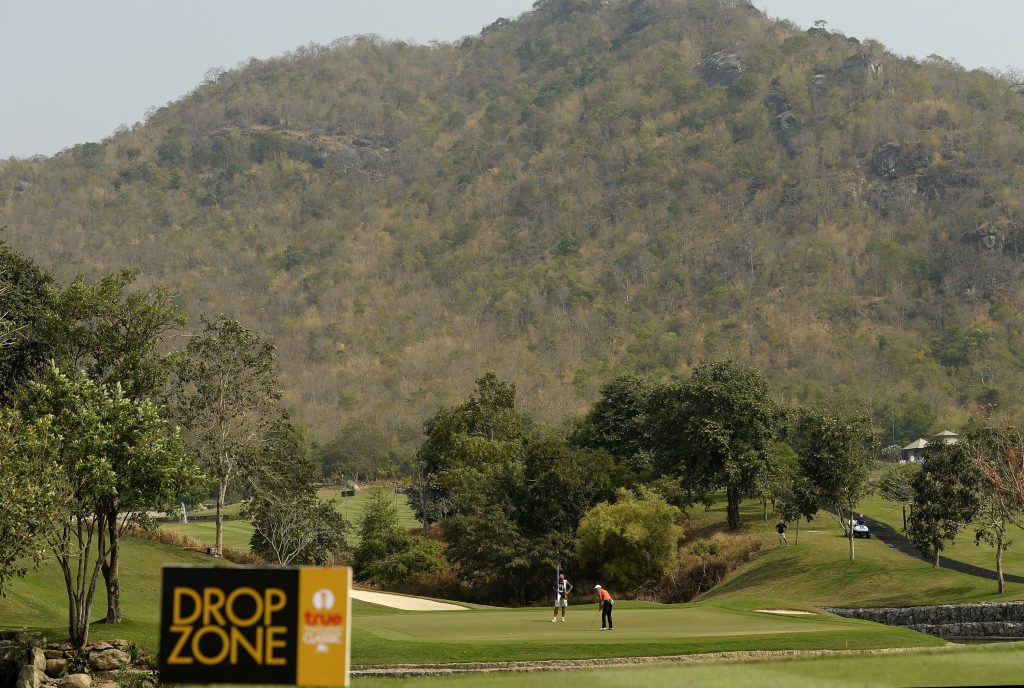
Black Mountain Golf Club
Hole 11 – Black Mountain Golf Club
Par: Three
Yardage: 191 yards
Hole scoring average: 3.2
Asian Tour events hosted: Black Mountain Masters, Thailand Classic, King’s Cup, Royal Trophy
This intimidating downhill par-three is the signature hole at Black Mountain Golf Club. It has a narrow double-tiered green, with two-thirds of it surrounded by water. A wall of trees protects the bail out area on the left, ready to deflect any shots hit in this direction back into the water.
According to two-time Asian Tour winner Rikard Karlberg and resident professional, who is also a Black Mountain club member, he says: “Never think about the water as you can lose shots very easily. You just have to aim and hit it straight to the middle of the green and hope for the best”.
“The 11th hole, the signature hole at Black Mountain, has the Black Mountain hill as its back drop. It is a tough green to hit, especially when the wind is blowing.
There is a feeling the green is an island green – even though it is not.
There is no real bail out on this par three as there is water just right of the green and if you were to pull the shot slightly left then there are over hanging trees and a stream where the ball is most likely to end up. The hole certainly is a challenge and if you walk off with par then most people will be happy.”
Simon Yates: is a two-time winner on the Asian Tour and resident at Black Mountain.
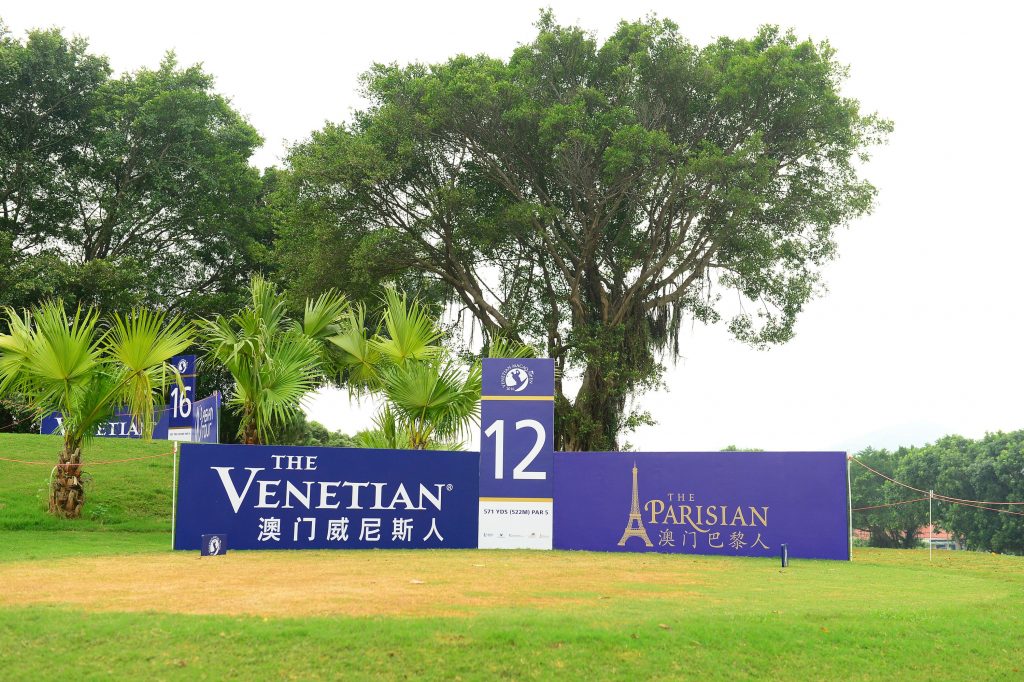
Hole 12 – Macau Golf and Country Club
Par: Five
Yardage: 571 yards
Hole scoring average: 5.2
Asian Tour event hosted: Macau Open
This hole demands astute ball control. Being a mountainous course, it can get very challenging with the wind constantly changing directions due to the many ridges and valleys that intersperse the property.
Firstly, a well struck drive is needed to avoid the troublesome fairway bunkers and to carry the ball over water. An accurate second shot is then required to avoid the bunkers guarding the lay-up area and penalty area on the left of this par five, which stretches and rises across the irregular terrain. This sets you up for a mid to short iron approach shot to a severely sloping two-tier green. Being on the correct tier with your approach shot here is paramount as this green has yielded more than its fair share of four-putts.
India’s Anirban Lahiri birdied this hole in the final round of the 2016 Venetian Macao Open – which was the first of an incredible run of seven birdies to force a play-off with Thailand’s Pavit Tangkamolprasert. Pavit eventually prevailed for this first win on the Asian Tour.
“On that final Sunday [in 2016], I used a driver for my first shot on hole 12. This hole is a long par-five – no one can really reach in two. On the second shot I used a hybrid – you just really need to get it on the fairway. Third shot I had about 100 yards left, so I used a 56-degree wedge which I pitched left of the flag and then made about a six yard putt for birdie. The hole is not as tough as 13, but the green [on hole 12] is very tough, especially if the pin is on the back as there is a huge slope.”
Pavit Tangkamolprasert – a two-time champion on the Asian Tour, and winner of the 2016 Venetian Macao Open.
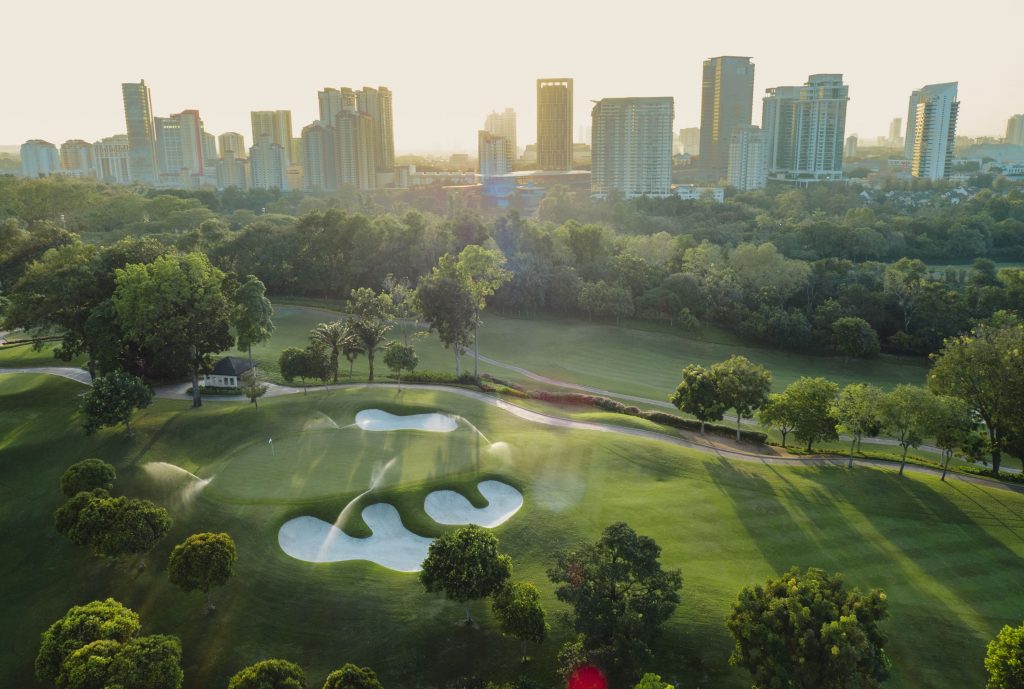
Hole 13 – TPC Kuala Lumpur (West course), Malaysia
Par: Four
Yardage: 459 yards
Hole scoring average: 4.38
Asian Tour event hosted: Malaysian Open
You will need both length and accuracy with your tee shot to play this hole – which is a lengthy uphill hole. A penalty area on the right and thick rough up the left side await wayward drives. A solid mid to long iron is then required to reach the elevated green. The right side of the green is preferred as deep bunkers guard the left side of the long and narrow green. Club selection will be important as the green has three tiers and any mis-clubbed approach shot can result in possibly having to negotiate some lengthy winding putts. Downhill putts will be especially challenging.
“I hit driver off the tee here, making sure I start my ball on the left side of the fairway. On this hole, the one place you don’t want to go is right. I try and hit a little fade as well. Most important is to keep it on the fairway. The toughest part of the hole is the second shot. There is a very high elevation, maybe about seven or eight metres up hill. I normally have a six iron in. I try to hit a draw as, if anything, you want to miss on the right side of that hole. If I walk away with par I will be very happy. So far I have played this hole well in tournaments, with a couple of birdies.”
Danny Chia: a two-time winner on the Asian Tour and four-time champion on the Asian Development Tour.

NEW DELHI, INDIA – MARCH 29: David Law of Scotland tees off the 14th hole during round two of the Hero Indian Open at the DLF Golf & Country Club on March 29, 2019 in New Delhi, India. (Photo by Ross Kinnaird/Getty Images)
Hole 14 – DLF Golf and Country Club, India
Par: Four
Yardage: 535 yards
Hole scoring average: 4.53
Asian Tour events hosted: Hero Indian Open, Avantha Masters, Johnnie Walker Classic
The 14th hole at the Gary Player-designed DLF Golf and Country Club is just a ruthless golf hole. Long is an understatement when describing this par-four which demands two massive and precise shots to reach the green. Adding to the challenge is the forced 250-yard carry off the tee over dense scrub that runs down the entire left side. Once you have the green in your sights, you will be faced with a downhill lie and needing at least a long iron to reach an elevated green with steep fall offs on either side.
It is a hole that probably cost American Julian Suri the Hero Indian Open title last year. Suri had a three-shot lead with six holes to play but made a quadruple-bogey eight, after taking six shots to get down from just off the green. He eventually had to settle for a share of fourth place.
“Normally when we play this hole, it is a par-four, otherwise for the club members it is a par-five. My personal view about that hole is that it is the toughest hole on the golf course and one of the hardest in the region. Firstly, for your tee shot you can’t hit a driver, some people do, because it is very narrow and there are some rocks placed beautifully on the right side of the fairway. Then you need to use anything from a rescue to a three-wood to a three iron depending on where your ball ends up, to a green that is a very narrow. You also come in from an angle – the green is basically towards the left side when you are standing in the middle of the fairway. Plus there is a huge swale before the green and on the right hand side of the green. And the green slopes left to right towards the swale. So it is difficult to stop the ball on the green unless you hit a high ball. Even if you try and hit a low shot and run it up you have to hit it way left because the green is all left to right and you have to have a perfect bounce.
If you go into the swale on the right … well the swale is at least 15 feet deep. During the tournament 80% of the golf balls end up there, even though players think their ball is on the green but everything slopes into the swale – where there are a lot of pitch marks. You want to make sure you hit a high lofted second shot onto the green, so it stays on the green. Some people try and take it left of the green but then what happens is it takes a big bounce and goes to the left hand side and you are left with a downhill chip and from there most of the time people chip it over into the swale on the right. Management is very important. A par on that hole is a bonus and you want to make the most of it and if you try and get too smart just try and make a bogey and move onto the next hole. I have never made a birdie there in tournaments, made a double once but normally pars or bogies.”
Jeev Milkha Singh: a two-time Asian Tour Order of Merit champion, and five-time winner on the Asian Tour. He has also claimed four titles in both Europe and Japan.

Hole 15 – The Serapong, Sentosa Golf Club, Singapore
Par: Four
Yardage: 429 yards
Hole scoring average: 4.20
Asian Tour event hosted: SMBC Singapore Open
A very intimidating par-four and one that enhances Serapong’s reputation as a true championship layout. The fairway is extremely narrow with a sea channel running all the way down the left side of the hole, where a countless number of balls have found a watery grave. It is also a long par-four that requires full concentration.
“The 15th is a really good hole. Visually intimidating off the tee, it is probably the most difficult tee-shot on Serapong, after the third hole.
I usually aim at the second bunker on the right with a three wood and play a draw. The reason for a draw is that in the worst case if you overdraw it and it ends up in the water you can at least drop the ball up in the fairway and still have a shot at the green. I have seen many players pull it straight left into the sea and have to drop the ball very near from the tee box … it’ll almost always be an automatic double when that happens.
If you are able to hit the fairway, I would say the hole becomes straight forward from there, but I have seen a lot of bail outs to the right.
If you are in the right rough, the second shot becomes tricky as you have to contend with the trees to carry for your approach.
A back left pin is the most difficult pin position on this hole. When the pin is there, we usually just aim for the middle of the green… if not you’d have to contend with the bunker and also water if you go long and left.
The majority of players will a hit fairway wood off this tee, however, there was one round when I played with Phil Mickelson and he pulled out a driver, hit it about 30 yards right of the fairway into the trees, but he was able to hit a really high shot over the trees and get away with par.”
Lam Chih Bing: a winner of 10 titles in the region including one victory on the Asian Tour at the Volvo Masters of Asia in 2008.

Hole 16 – Namseoul Country Club, Seoul, Korea
Par: Four
Yardage: 533 yards
Hole scoring average: 4.75
Asian Tour event hosted: GS Caltex Maekyung Open
The 16th hole is a straight and long downhill par-four with OB all the way down the right. It requires precision off the tee to a narrow fairway guarded by bunkers on the left and at the end of the landing area. A long iron or hybrid will be needed for your approach shot, however the downhill lie will hinder your efforts at keeping the ball on this green. Bunkers short and over the green are always in play with the OB once again in play down the right.
Prior to the 2017 edition of the GS Caltex Maekyung Open, this hole was played as a par-five for the tournament. After changing to a par-four, it has since become the toughest hole of the tournament for the last three years.
“Nam Seoul’s 16th hole is the hardest hole on the course. On the tee I usually hit five-wood or hybrid depending what club I use for that week. You want to hit something around 260 yards so you are just short of the fairway bunker and not too far from the hole.
I usually have about 200 to 215 for my second depending on how well I strike it. Most of the time I will use a five iron to this green. This hole is so hard because you will have to hit your second shot from a downhill slope, which it makes it so hard to stop the ball on the green, and there are two deep bunkers around the green. This hole is so hard that when I make par on this hole I feel like I made a birdie. One interesting story that I have involves the first round from last year. I had an afternoon tee time and I was playing well and I believe I was leading the tournament at that time, until the 16th hole. I don’t know what happened but I ended up making a quadruple bogey and everything went south from that point…”
Yikeun Chang: winner of the 2019 Yeangder TPC and the 2016 Qualifying School. He was also runner-up at the GS Caltex Maekyung Open in 2018.

Hole 17 – Royale Jakarta Golf Club, Indonesia
Par: Four
Yardage: 459 yards
Hole scoring average: 4.29
Asian Tour event hosted: BNI Indonesian Masters
The 17th hole is a lengthy par-four at Royale Jakarta Golf Club. To master this challenging hole, you need to execute a well-struck tee shot to a less than generous fairway. A penalty area that runs all the way down the right and thick rough down the left will definitely test your nerves. And depending on the wind direction and quality of your tee shot, the approach shot can be with anything from a short-iron to a long-iron, to an undulating green that is guarded by a bunker on the left and water short and to the right of the green.
“That is a great hole, it is definitely one of the most challenging holes, especially for the 17th hole of a golf tournament. For the longest time, I have always played that hole hitting three wood over the little bunker in the middle there because to me it’s the widest part of that fairway, although it is not very wide to begin with. Once you get up to 290 to 300 yards that’s where the fairway gets narrower. Typically the rough has always been thick at Royale Jakarta but the last few years it hasn’t been so, so it’s been manageable. Teddy [Teddy Harmidy his friend, and caddie at the 2019 BNI Indonesian Masters] had me try and hit driver there when we were preparing for the tournament, a few months before. He said if I am going to caddie for you I want you to try this. So I did that and hit it out there and once I saw where my ball ended up, even if it wasn’t in the fairway, I realized I am only hitting a nine iron at most into the green. Normally with a three wood off the tee I am hitting maybe a six, seven or eight iron into the green. So it’s been an ongoing debate, what’s more important? Hitting in the fairway or long. So I started to change my mind set. And I started to realize I do hit it quite far so I should take advantage of that on some of these longer holes, even if you are going to be in the rough. The green slopes left to right and so anything left of that green is dead. Where they put the pins there is quite challenging. I actually bogeyed it the first two days last year and birdied it the third round and parred on the last day. You need to hit a good second shot with that green. There are not many flat spots on the green, maybe one. A par on the hole is very good.”
Danny Masrin: a seven-time winner on the PGA Tour of Indonesia, who finished equal fifth in the 2019 BNI Indonesian Masters.
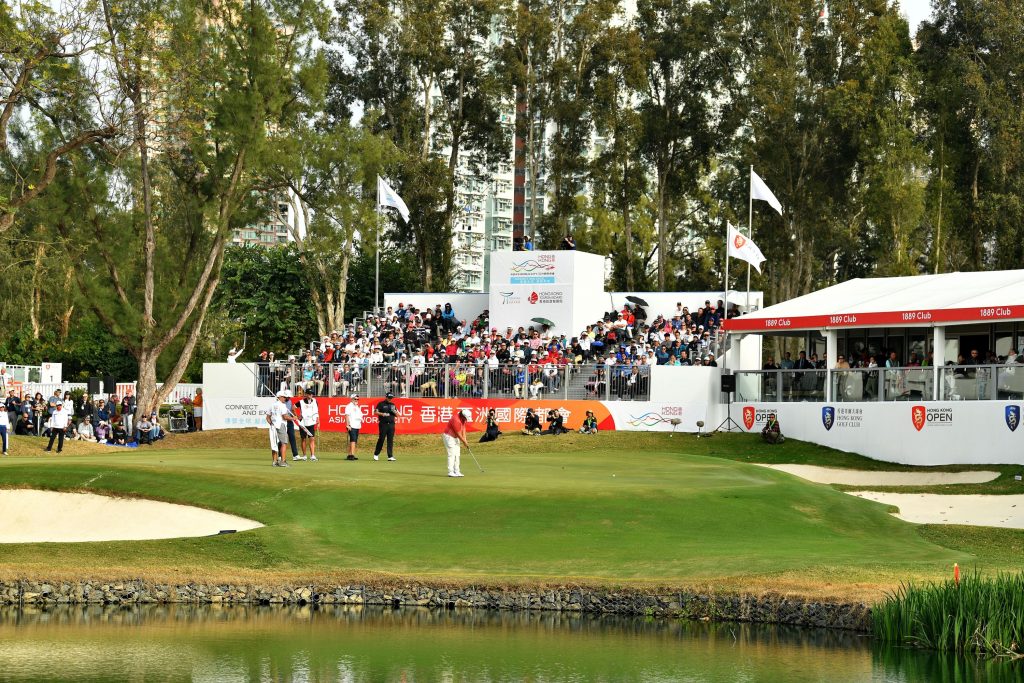
HONG KONG- The Hong Kong Open at the Fanling Golf Club, Fanling, Hong Kong, the Asian Tour USD$ 1 million event is the season opener. Picture by Paul Lakatos / Asian Tour.
Hole 18 – Composite Course, Hong Kong Golf Club
Par: Four
Yardage: 410 yards
Hole scoring average: 4.281
Asian Tour events hosted: Hong Kong Open, Alfred Dunhill Masters, Johnnie Walker Classic
Known as “The Ultimate”, this is the closing hole on the Eden Course at the Hong Kong Golf Club and also the final hole of the Composite Course – a famous layout consisting of the best holes of the Eden and New Courses, specifically configured for the Hong Kong Open.
It is a hole deeply ingrained in the rich history of Asian golf, and viewed as one of the great amphitheatres of tournament golf globally.
Though not a long par-four, by modern-day standards, it demands the utmost respect, and requires the fullest care and consideration.
The hole’s statistics at this year’s Hong Kong Open, tell a familiar story: measuring 410 yards, it was ranked the second hardest with an average score of 4.281; there were just 40 birdies, 215 pars, 101 bogeys, 19 double-bogeys and two “others”.
Off the tee, most players will favour a long iron to the widest part of the fairway on the left. However, if you are brave enough, you can choose to go with a three-wood or driver and attempt to thread the ball through the narrowest part of the fairway to set up an easier approach shot. With trees and OB threatening on the left and a dense cluster of trees and bunker to the right of the fairway, it is risk verses reward.
Having chosen your strategy and, hopefully, successfully executed it, it is time to take on the green. Although the elevated green is large, it is severely sloped from back to front, so it is always preferred to be putting from below the hole. There is a large lake in front of the green with bunkers the front and right. And any shot missed left will leave you in gnarly rough with a slim chance to get up and down.
It has been the setting for a wealth of gripping and well-documented drama over the decades.
Who can ever forget the heroics of Lin Wen-tang’s memorable play-off victory over Francesco Molinari and Rory McIlroy at the Hong Kong Open in 2008. Lin produced one of the finest shots ever seen on the 18th: after hooking his tee shot, he played a spectacular approach out of trees, over water, and a bunker, to within inches of the pin.
And, in 2011, McIlroy recorded his maiden triumph at the Hong Kong Open in remarkable fashion when he holed out from a greenside bunker at the last to finish two shots clear of France’s Gregory Havret.
“I usually hit three-wood these days, try to hit a fade off the trees on the left but usually end up in the trees! At the Hong Kong Open in 1996, I hit a two-iron off the tee and then an eight-iron to about 12-feet. I made the birdie putt to finish fourth.
In the 1996 Alfred Dunhill Masters I holed a bunker shot from the right bunker for birdie to finish T11, I think. There were massive crowds that year. Langer, Els, Ballesteros and Monty were all playing. There must have been 20,000 people there that day.”
Dominique Boulet: a former Asian Tour player and Hong Kong number one. Now a highly respected television commentator and long-time member of the Hong Kong Golf Club.
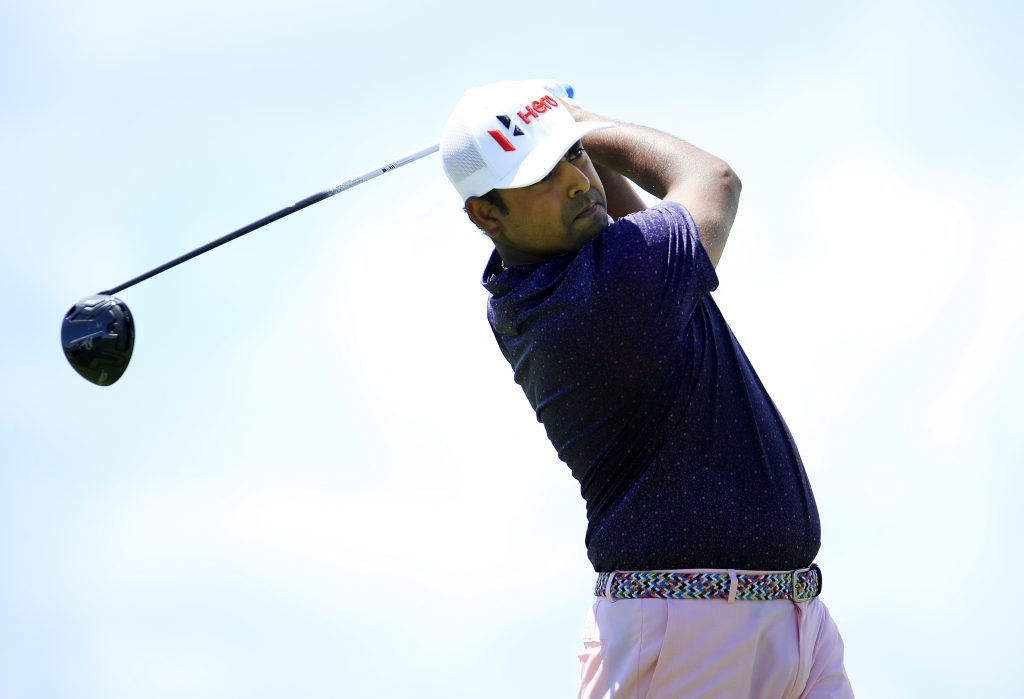
By V.Krishnaswamy, @Swinging_Swamy
Anirban Lahiri felt confident even before he teed up last week at the Corales Puntacana Resort & Club Championship so much so he did not book a return ticket home but instead booked himself on a charter to the next venue. Yet, he found himself four-over after the first three holes, before beginning a terrific fightback and finished tied-sixth at the end of the event at Punta Cana, Dominican Republic.
Lahiri was amply rewarded for the way he backed himself as he shot 2-under 70 on the final day to total 13-under for the week and finish T-6, his first Top-10 in almost two years since the T-10 in the Mayakoba Golf Classic in Mexico in November, 2018. He was also T-6 at WGC-Bridgestone in August, 2018.
Hudson Swafford (69), who at one stage held a four-shot lead managed to hang in and fend off Tyler McCumber (66), who played with Lahiri, to win the title. Swafford totalled 18-under, one ahead of McCumber, while Mackenzie Hughes (70) was third at 16-under.
Swafford’s second PGA Tour win, the first since 2017, earned him 500 FedExCup points and entries to the Sentry Tournament of Champions, 2021 Masters Tournament, THE PLAYERS Championship and PGA Championship.
While Lahiri logged a fine finish, his colleague Arjun Atwal (77) slipped and ended T-70. What was even more pleasing for Lahiri was that the Top-10 finish ensured him a spot in next week’s Sanderson Farms Championship.
Lahiri said, “Well, I did not book a return flight and I booked myself on the charter (to the next venue), so this is going to be good for my confidence because I backed myself to do this.”
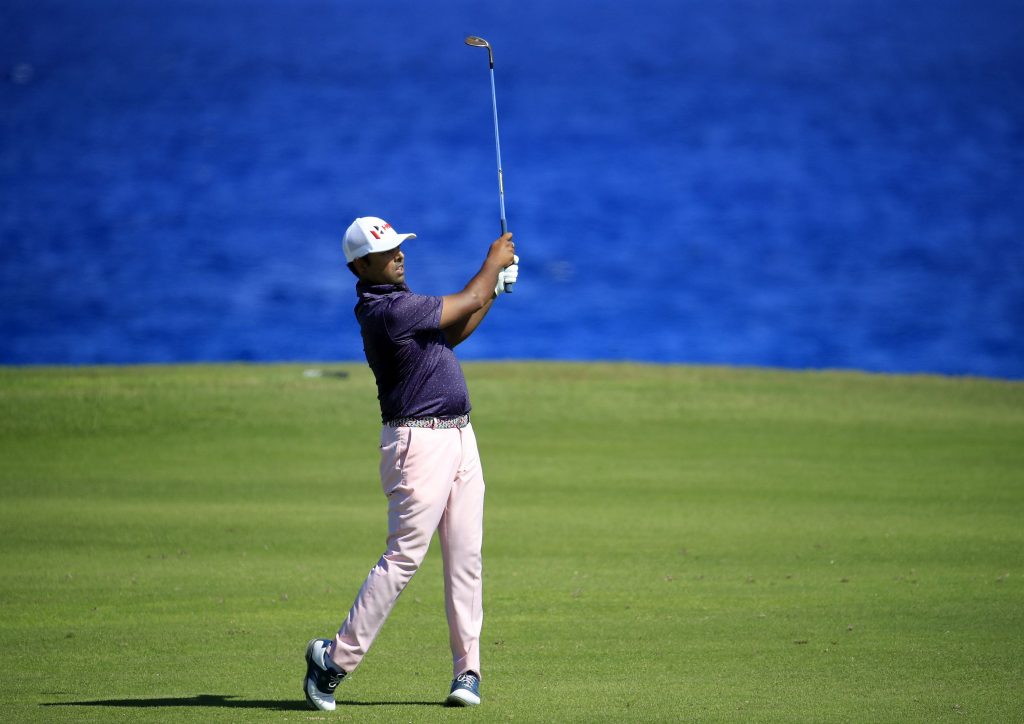
PUNTA CANA, DOMINICAN REPUBLIC – SEPTEMBER 27: Anirban Lahiri of India plays his second shot on the eighth hole during the final round of the Corales Puntacana Resort & Club Championship on September 27, 2020 in Punta Cana, Dominican Republic. (Photo by Andy Lyons/Getty Images)
About next week’s Sanderson Farms, an event he has played in the past, Lahiri said, “I wasn’t in (he was the ninth alternate at one stage). Now this (Top-10) gets me in.”
Lahiri had the second highest number of birdies this week at 22 and led the field in putts per Greens In Regulation.
On Sunday, Lahiri made birdies on sixth, eighth, 12th and 15th and dropped shots on third and 11th.
Lahiri, who did not have taken advantage of any of the Par-5s on the final day, said, “I felt really good after my first event in Napa. I had two really good rounds to finish that event as well, so I got it rolling here with some of that. Definitely I’ve managed to build that snowball and build some momentum. Hopefully I use this going forward and kind of keep this going and maybe even play a little better.”
It was a disastrous start for Lahiri on the opening day as he had a triple bogey on the second and a bogey on third to go 4-over through his opening three holes. He fought back with an eagle and a bunch of birdies and finished the first round at 69 and 72 on the second saw him make the cut on the line at 3-under.
It was Saturday’s flawless 64, that ironically included a 3-putt, which brought Lahiri into the picture.
Lahiri admitted, “The last couple of seasons, I’ve been very disappointing, and where I find myself in my eligibility is not great, so I need to play myself into some of the events that I like to play. Definitely have a lot of opportunities in the fall that I need to take and build on that. Hopefully get closer to being really in contention on Sunday. I’ve had outside chances, but the goal is to kind of get to the last few with a realistic chance or maybe even a lead.”
Meanwhile, China’s Xinjun Zhang, who started the final round in fourth position, endured a disappointing final round as he closed with a 74 to finish tied 11th, his second top-15 finish of the 2020-21 PGA TOUR Season after coming in T14 at the Safeway Open two weeks ago.
Joohyung Kim (72) was T-33 and Kiradech Aphibarnrat (69) ended T-70 alongside Atwal.
Nate Lashley (69) was fourth and overnight leader, Adam Long (75) fell to fifth. Lahiri tied for sixth with James Hahn (69).
Ends.

American John Catlin completed a memorable day for members from the Asian Tour on Sunday by winning the Dubai Duty Free Irish Open at Galgorm Spa & Golf Resort.
It was his second win on the European Tour in the space of four weeks and will see him add the prestigious title to an impressive trophy cabinet that also includes the silverware from four wins on the Asian Tour and two triumphs on the Asian Development Tour.
Thailand’s Jazz Janewattananond, last year’s Asian Tour Order of Merit champion, also excelled by finishing in a tie for third while Scott Hend from Australia – the winner of 10 titles on the Asian Tour – was equal 11th, with another Asian Tour winner Justin Harding from South Africa.
Catlin, voted the Players’ Player of the Year on the Asian Tour thanks to three victories in 2018, birdied three out of the last four holes to card a brilliant closing six-under-par 64 – for a tournament total of 10 under.
He won by two from England’s Aaron Rai – the overnight leader – to earn €199,750 (approximately US$ 232,356).
Earlier in the month, the American held off two-time major champion Martin Kaymer from Germany to win his maiden European Tour title at the Estrella Damm N.A. Andalucia Masters at Valderrama Golf Club in Spain.

Antrim , United Kingdom – 27 September 2020; John Catlin of USA watches his drive from the 16th tee box during day four of the Dubai Duty Free Irish Open Golf Championship at Galgorm Spa & Golf Resort in Ballymena, Antrim. (Photo By Brendan Moran/Sportsfile via Getty Images)
“I’m so happy. I was talking to someone earlier about where I was at four years ago and to be here is so surreal and a testament to my coach and all the hard work we put in. It’s so awesome to just be here,” said Catlin, whose most recent win on the Asian Tour was last year’s Thailand Open.
“There are so many years of hard work that have gone into this moment. It was my goal to win again at the start of this week so to accomplish that is to do something truly, truly special.”
He only dropped one on the last day, at the 13th, and birdied seven holes, including the par-five 18th.
“You never know if you’re going to win or not and to get that monkey off my back at Valderrama really freed me up today to know that I can look myself in the mirror and tell myself honestly that I’ve been here before and I can do it again,” added the 29-year-old Californian.
“I’ve always wanted to play in the Majors, that’s the only level of golf that I haven’t played at and hopefully one day I can win one of those as well.”
He will play in the Aberdeen Standard Investments Scottish Open this week, followed by the BMW PGA Championship.
Jazz, a six-time winner on the Asian Tour and chasing his first win in Europe, closed with a fine 69, to finish three behind Catlin.
The Thai star birdied the tenth to take the solo lead but later made a costly double on 14 after taking a drop.
Over at the Corales Puntacana Resort & Club Championship, India’s Anirban Lahiri came in tied-sixth after closing with a two-under-par 70, marking his first top-10 finish on the PGA TOUR since the 2018 Mayakoba Golf Classic (T10). He earns a spot in this week’s Sanderson Farms Championship thanks to the commendable result.
Korea’s Joohyung Kim settled for a tied-33rd place finish while Arjun Atwal of India and Thai star Kiradech Aphibarnrat were tied in 70th position.
Ends.

When American rookie Trevor Simsby holed a four-foot birdie putt to beat Andrew Dodt, from Australia, in a sudden-death play-off at the Bandar Malaysian Open in March, it not only sealed his first win on Tour but the occasion also helped cement an important relationship that has lasted over two decades.
Kota Permai Golf & Country Club, the tournament’s venue, has been the proud host of events on the Asian Tour since first staging the Volvo Masters of Malaysia in 1998 – the year the club opened.
And over the past 22 years it has staged a wealth of Tour events, including: two Malaysian Opens, the Selangor Worldwide Masters twice, six Volvo Masters and a pair of World Cup Qualifiers.
It has been a special venue on Tour ‒ something that Thailand’s Thaworn Wiratchant will agree with having won the 2001 Volvo Masters of Malaysia and Selangor Worldwide Masters in 2012 on Kota Permai’s pristine playing surfaces.

Hole No. 2 at Kota Permai GCC
Many will also remember American Kevin Na ‒ aged just 19-years-old ‒ winning the Volvo Masters of Asia at Kota Permai in 2002, before departing on a highly successful and lucrative career on the PGA Tour.
In August, the popular Kuala Lumpur venue took another exciting step forward with its’ Tour association by becoming part of Asian Tour Destinations – an exclusive network of world-class golf venues, with direct ties to the Tour.
The other current Destinations venues include: Sentosa Golf Club in Singapore, Black Mountain Golf Club in Hua Hin, Thailand, and the Classic Golf & Country Club in New Delhi, India. Additional world-class Destinations will be added to the network over the coming months.
The Asian Tour Destinations brand offers a wide range of benefits to its members and the Tour, helping them to achieve their commercial and strategic goals.
It provides an affiliate membership programme between the associated venues – which have a collective membership base of 7,500 golfers.
Also, being a part of the network means that each venue is certified Tour calibre and operates a comprehensive range of facilities and services to their members and guests under tournament-ready conditions all-year round.
Among the core benefits, Asian Tour members will be able to play and practice at each venue – allowing for the members at each club to enjoy direct engagement with the region’s best golfers.
“This is a very exciting development – one we have eagerly been anticipating. In terms of what we are looking forward to, it is pretty much threefold,” says Tang Meng Loon, Director of Club, Township & Property Management at Gamuda Land – the owners of Kota Permai.
“Firstly, more involvement with the Asian Tour – to be a host venue for tournaments or a platform for any programmes sanctioned by the Tour.
“Secondly, seeing Tour players here at Kota Permai away from tournaments will be amazing. We will be able to get their feedback for improvements, plus members and guests will really enjoy seeing them here, whether playing, practicing or socializing in the clubhouse. It’s going to be great to see them here and it will definitely increase interest to play here.
“Thirdly, we will be able to foster interclub relations with the management teams of the other Asian Tour Destinations’ partners, exchange advertising and promotion support, and welcome their members to Kota Permai, relishing the chance to host them.”

Hole No. 16 at Kota Permai GCC
In addition, by aligning themselves to an even greater degree with the Asian Tour, the club are hoping to achieve one of their key objectives: to see their venue continue to rise from being one of Malaysia’s top golf club’s – a position it proudly holds today – to one of the premier golfing Destinations in the region.
“We want to provide the best possible experience to all who walk through our doors and we want to constantly improve in all areas. With Asian Tour Destinations, this is now very possible,” added Tang.
The club currently has over 4,000 members and averages 5,900 rounds a month. And it is well known for being the ultimate recreational hub, for as well as boasting an 18-hole golf course – designed by Ross Watson – it also has a pro shop, driving range, gymnasium, badminton, squash and tennis courts, swimming pools, sauna and steam baths, F&B outlets, function rooms, and a children’s playground.
Says Tang: “We have a constant drive to improve in all areas – whether it be in operations, branding, marketing, strategic partnerships, or administration.
“We are continuously working on the maintenance and upgrade of the golf course, plus the provision and upkeep of world-class club facilities and amenities that offer excellent customer service.”
This policy of progression has resulted in the club being the recipient of a host of important accolades – including the coveted “Malaysia’s Best Golf Course” award in 2014, 2016, 2017 and 2018 at the World Golf Awards. And, it has also earned similar honours at the Asian Golf Awards over the years.
And, the club have weathered the storm caused by the coronavirus pandemic by gradually resuming business.
“As per government directives, we had to close the club and cease all operations earlier in the year. Since the beginning we have followed the strict standard operating procedures but we are delighted to say we are almost back to normal – just operating under the ‘new norm’ of things,” said Tang.
Simsby, for one, will be happy to hear that.
Said the American after his win: “I really felt good about the golf course, and was in awe of how good the condition was. It was in tremendous shape all week.”
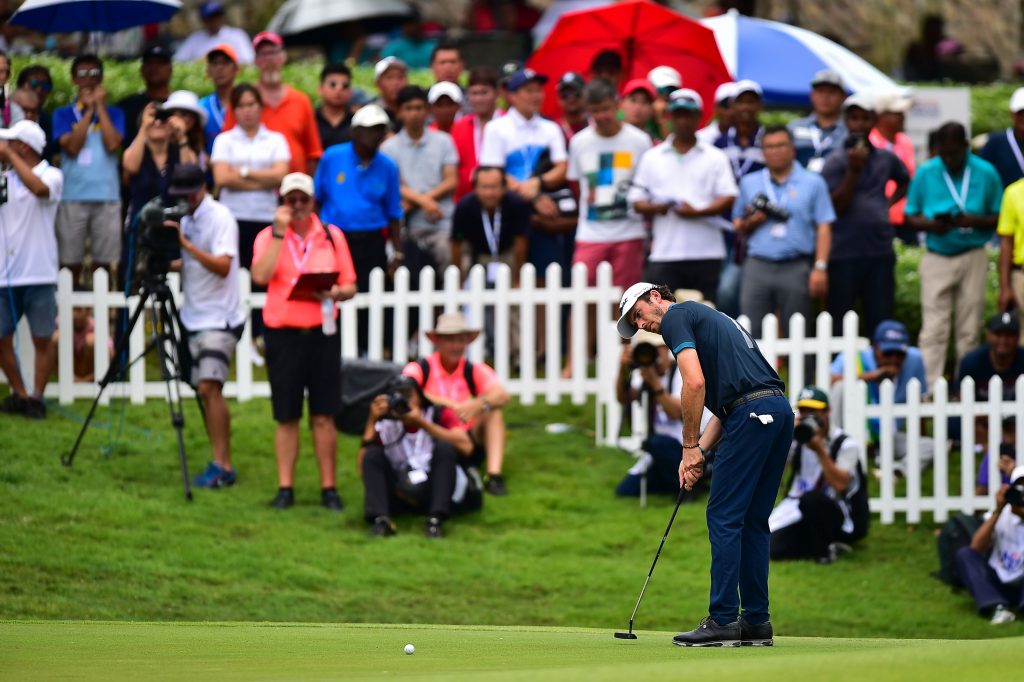
Trevor Simsby of the United States

Thailand’s Gunn Charoenkul says two wins in quick succession on the Thailand PGA Tour recently were the result of a new positive mindset, as well as a little inspiration from his new paternal responsibilities.
He won the Singha-SAT Hua Hin Championship in July for his first victory in five years and then two weeks later claimed the Singha-SAT Nakhon Nayok Classic.

“I really needed a win as it had been four or five years,” said Gunn.
“So the mind set on the last day was to play my own game and just keep thinking about winning and just keep myself in the zone. Be relaxed all the time.”
He beat countryman Prom Meesawat by six strokes at Royal Hua Hin Golf Course before overcoming compatriot Nirun Sae-Ueng in a sudden-death play-off in the Nakhon Nayok Classic – played at Royal Hills Golf Resort & Spa.
“I was pretty nervous because I was playing with Prom at his home course, and he pretty much knew all the nooks and crannies of the course,” said Gunn.
“I had a five shot lead on the last day. All of Proms shots were pin high and close but I was fortunate he didn’t make any putts. But I didn’t trust myself at all because I was close to victory.
“My last victory five years ago, I finished with a bogey, or a double, and then a playoff. So it wasn’t until the last, when I had a six shot lead, that I felt confident I can take the trophy home.”
At Royal Hills, he trailed Prayad Marksaeng by three shots on the back nine and felt the legendary Thai star would run away with the tournament.
“I thought maybe finishing third would not be too bad,” said Gunn.
However, Prayad had a hiccup on 16 where he made a double before dropping a shot on 17.
“I had a 20 footer on 18 for birdie to make a play-off. But I never had a good experience when I needed to hole an important putt. So I didn’t take it that seriously and thought I would miss it. And I misread the putt but somehow I made it,” added the Thai.
Niran found water with his second when they returned to 18 for the play-off leaving Gunn in the drivers’ seat.
“I told myself just hit the green otherwise it is going to be a long day. I hit it on the green and made my birdie putt so it was all over. It was a breakthrough for me as when I lost a lead in the past I never made a comeback. So this was the first time for me. So I guess if there is a next time I can believe there is a chance I can win again,” said Gunn.

His wife Koyy gave birth to their daughter, Vera, in February and he feels that has also helped to put a better complexion on things.
He says: “It has made a big difference to my life. I don’t really have any time for myself now. All my time goes to her. I keep myself busy, doing laundry, cooking her food, doing kids club, swimming class. So it is a new experience for me. I have always been pretty introvert, just happy staying home, but now I am going out and seeing the world.
“I don’t get to practice so much but it does take my mind off the golf game a bit. If I get a chance I can check my swing in a mirror. It has really helped to relax myself a bit.”
Gunn was in brilliant form last year on the Japan Golf Tour Organization – he finished 21st on the Money List with 10 top-10s – and made an outstanding start on the Asian Tour this year: he was third in the Hong Kong Open and reached ninth place on the Order of Merit before the Tour was put on hold by the coronavirus pandemic.
“My mentality before was I never really appreciated the small things in my life, but now I do and I feel very happy. And all the happy little things add up so when I am on the course I feel very relaxed. Just in my own comfort zone. To perform well, you have to find your own comfort zone, to perform at your best.”
Ends.
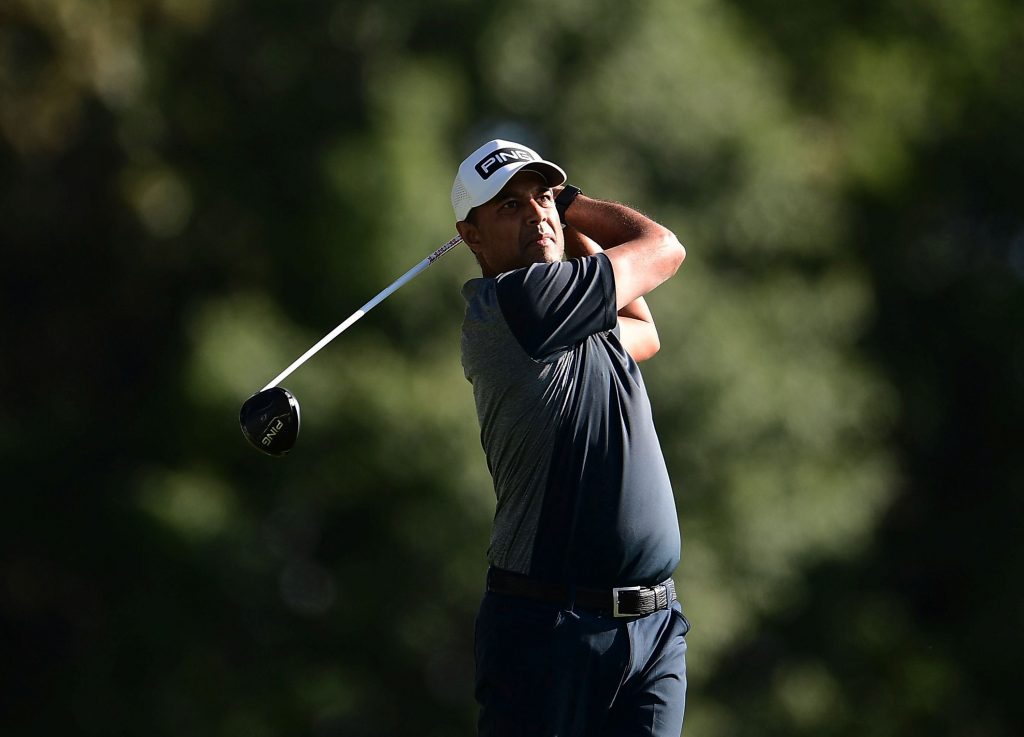
By V.Krishnaswamy, @Swinging_Swamy
Anirban Lahiri and Arjun Atwal will tee up together in the same group at the Corales Puntacana Resort & Club Championship starting on Thursday. While Lahiri, who was T-36 at Safeway Open, makes his second start of the season, Atwal, who played four events when golf returned after the hiatus due to Covid-19, makes his first start of the new season. They are grouped together alongside David Hearn in the Dominican Republic.
There is more Indian connection, as the field also includes two-time PGA Tour winner, the Indo-Swede Daniel Chopra, a great friend of both Lahiri and Atwal. Yet another one in the field is 18-year-old left-hander Akshay Bhatia, who is of Indian origin, but was born and brought up in the United States, and is now mentored by Phil Mickelson.
Lahiri and Atwal go off together at 11.30 am local time on first day, while Daniel Chopra plays with Johnson Wagner and Seamus Power in one of the earliest groups at 6.50 am, and Akshay Bhatia plays with Ted Purdy, who an Asian Tour event in India in 1997, and Joseph Bramlett at 8 am.
The Asian Tour flag will also be flown by Kiradech Aphibarnrat and Joohyung Kim and Kurt Kitayama this week.
Lahiri was happy with his start at Safeway Open and is hoping to gain further momentum, as he makes his debut at the Corales Puntacana Resort & Club Championship in the Dominican Republic.
A confident Lahiri, said, “The game feels really good at the moment. Safeway was a good confidence booster as after the bad start, I was able to finish strong which felt great.”
Playing in his sixth season on the PGA Tour, Lahiri had done well to recover from a first round 74 at Safeway to add rounds of 65, 67 and 70. It was his best finish since T30 at the Valspar Championship in March, 2019 and his second round 65 was his lowest score since shooting the same number during the second round of the John Deere Classic in July, 2019.

GREENSBORO, NORTH CAROLINA – AUGUST 13: Anirban Lahiri of India plays his shot from the 18th tee during the first round of the Wyndham Championship at Sedgefield Country Club on August 13, 2020 in Greensboro, North Carolina. (Photo by Jared C. Tilton/Getty Images)
“I spent a lot of time during lockdown in India, where I went for Hero Indian Open (his last win came at the same event in 2015) but with it being cancelled and the lockdown happening I stayed on in India with the family. And I returned for just one event, Wyndham, in the previous season and then the Safeway. So, I rested and also worked during my downtime at home with my coach Vijay Divecha,” said Lahiri, a former two-time Presidents Cup International Team member. “We worked on various aspects, broke down everything and did a lot of work on swing and re-built it in a way.”
Lahiri, who is making his first trip to the Corales Golf Club, which has six holes that run along the Caribbean Ocean, said, “The golf course here reminds me of my days on the Asian Tour. Similar grasses and temperatures and conditions to what I played for years back home. Definitely a feeling of familiarity even though it’s my first time here.”
Atwal, India’s first and only winner to date on the PGA TOUR, is seeking a strong start to the 2020-21 season. He played in four events when golf returned to action during the pandemic. He made cuts in three of them, and missed only once in Wyndham, an event he won in 2010.
“It felt good during that stretch and playing four times in seven weeks also gave me an idea of my strength, because during practise rounds, we mostly use carts. I am proud that I held up at 47,” said Atwal with a characteristic laugh. “It will be great to play with Anirban. It is like playing at home and in a great atmosphere and the venue itself is superb. I am looking forward to this.”
The field has some familiar Asian Tour names like Kiradech Aphibarnrat and Kurt Kitayama.
The highest ranked player in the field Henrik Stenson at No. 43 and it also includes the defending champion Graeme McDowell, who while winning the 2019 edition ended a five-year-long PGA Tour title drought, though he won in February this year. He has however missed seven cuts in his last nine starts since the Tour re-started in June.
One of the most keenly watched players will be Will Zalatoris, who in his first start on PGA Tour since Wyndham 2018, finished T-6 at the US Open at Winged Foot. This Korn Ferry graduate is the one to watch for in the near future.
Ends.
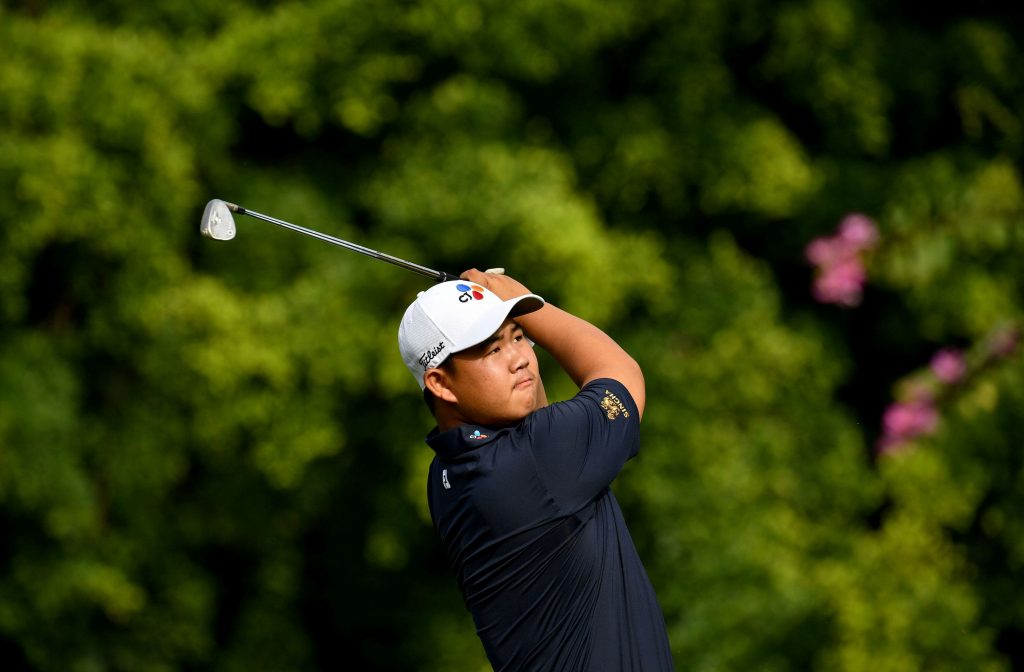
As if the fledgling career of Korean teenager Joohyung Kim could not get any more exciting, this week he tees-off in the Caribbean at the Corales Puntacana Resort & Club Championship – in the Dominican Republic.
And in what is only his third start on the PGA Tour, there is one thing he is focused on.
“It’s what I’ve learned from my past couple of events,” said Kim, at his first virtual press conference on the PGA Tour.
“I think that’s my goal this week, just play really smart, take advantage when you can, not to get too aggressive, just play my own game. And that’s always been me.”
In August, he made his debut on the PGA Tour at the PGA Championship – where he missed the cut in what was also his first appearance at a Major championship.
But two weeks ago at the Safeway Open – the opening event of the 2020/2021 season – impressively, he played all four rounds shooting 67, 72, 75 and 70 to finish in a tie for 67th on four under.
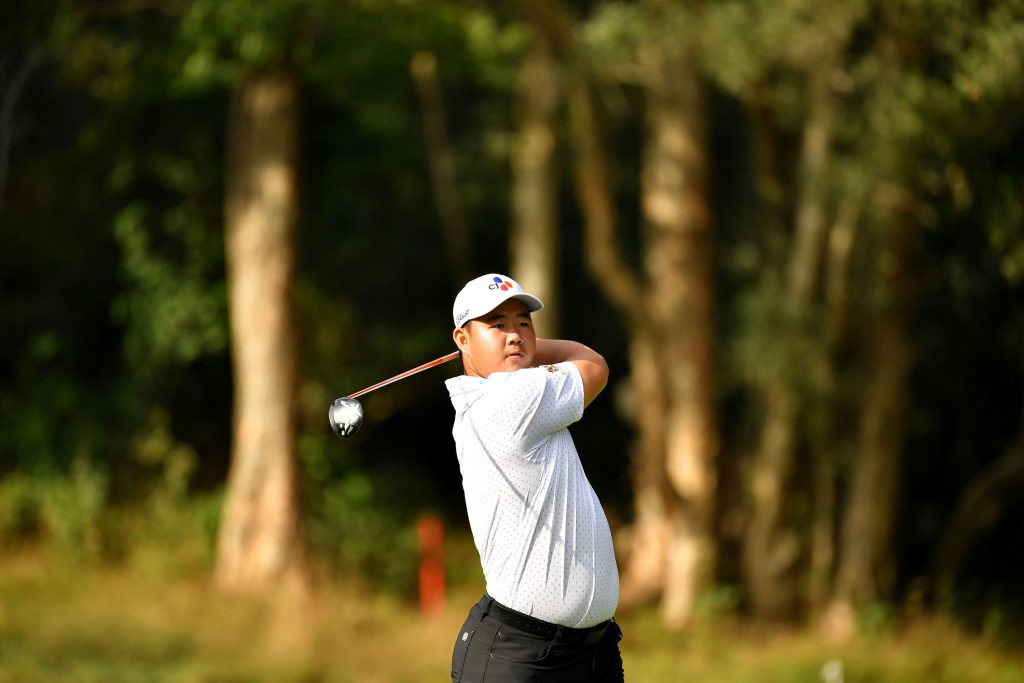
HONG KONG- The Hong Kong Open at the Fanling Golf Club, Fanling, Hong Kong, the Asian Tour USD$ 1 million event is the season opener. Pictured by Paul Lakatos / Asian Tour.
“Sometimes you get gnarly lies here and just tough pins, sometimes you just really have to take your medicine, just make a good bogey instead of like at the Safeway Open. I remember I shot five under the first round, gave myself a good chance, so kind of felt like I wanted to keep shooting under par. I went for a lot of pins which I shouldn’t have, I was playing really aggressive and I feel like sometimes you don’t need to do that,” added the Korean, who is just 18 years old.
“I feel like I was pushing myself a lot and I made a lot of soft bogeys and a lot of mistakes. I didn’t really have the week that I wanted. Even in the PGA Championship, I just kind of pushing too hard. And, you know, with the conditions, sometimes a soft bogey is okay.”
At the PGA Championship he shot rounds of 70 and 77 to miss the cut by six.
Last year, after earning a battlefield promotion from the Asian Development Tour by winning three events, the youngster made an instant impact by winning on just his third start on the Asian Tour at the Panasonic Open India.
That made him the second youngest professional to win on the Asian Tour at 17 years and 149 days, with countryman Seungyul Noh being the youngest when he won the 2008 Midea China Classic at the age of 17 years and 143 days.
When asked about his long-term ambitions in the game, the confident Korean did not beat around the bush.
“I really would love to be world number one. That has always been like a goal just because Tiger Woods was so dominant as world number one for so many years. So that has always been like a major thing for me.
“I would obviously love to play on the PGA Tour, win all four majors, be in the Golf Hall of Fame – just those big things I always would love.”
And when asked how his English name, which is Tom, came about, he replied: “Actually, it was actually Thomas. I got it from Thomas the Train [Thomas the Tank Engine television series] when I was young. As I grew older, some people started calling me Tom and I thought it was just shorter and just simpler. I think by the time I was like 11, I went just by Tom. My brother even calls me Tom. It was kind of natural. And my family calls me Tom as well, my friends all call me Tom, so it kind of came natural to me. It was that kind of a name. I had the whole thing, I had the lunchbox, I had the toys, yeah.”
This week, he has been paired in the first two rounds with Swede Carl Pettersson and Michael Gligic from Canada, at 1pm local time in the Dominican Republic.
Ends.
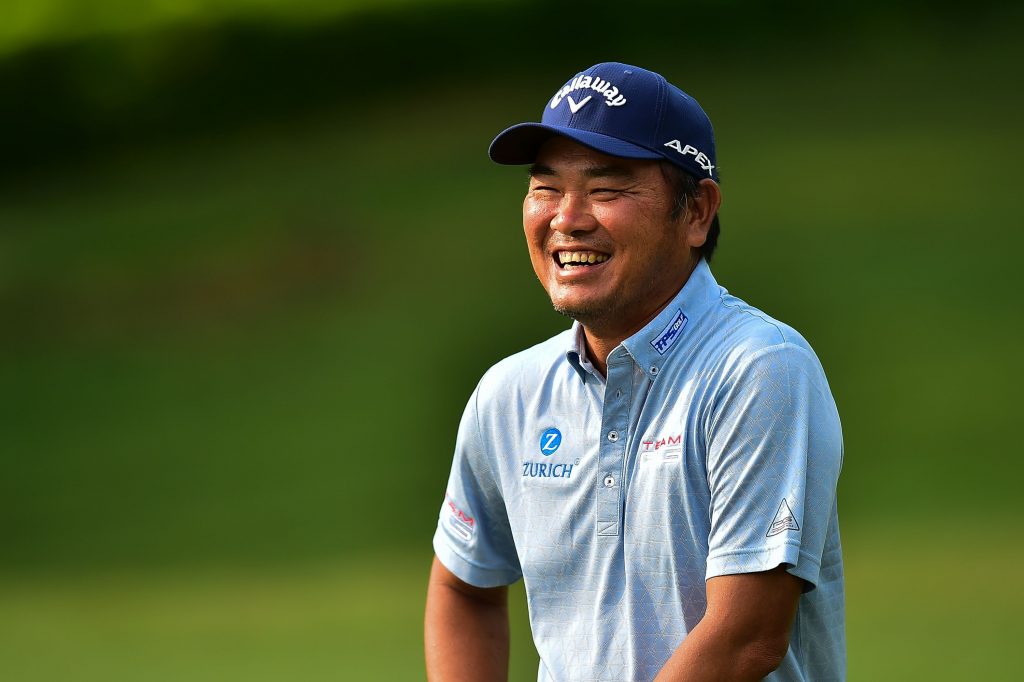
Chinese Taipei’s Wang Ter-chang has achieved so much in the game, including six victories across the region, but ‘not a lot of people know that’ he also made an important contribution to Malaysian golf.
On this day 18 years ago, Danny Chia made history by becoming the first Malaysian to win on the Asian Tour – a long-awaited and monumental achievement.
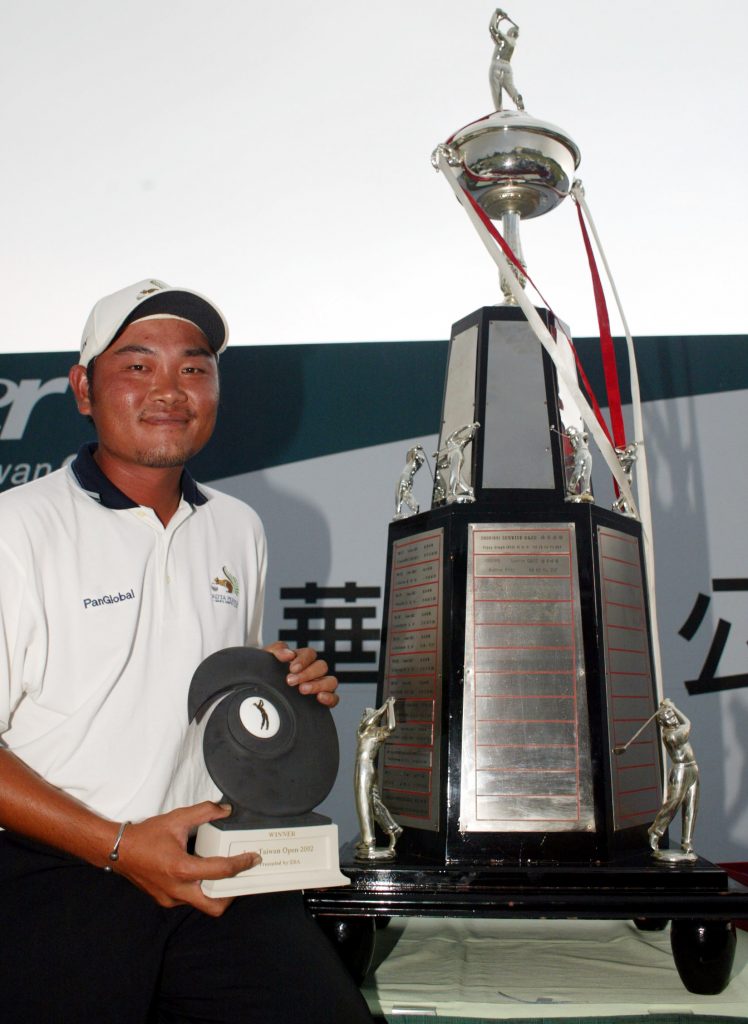
220902 – Asian PGA player Danny Chia of Malaysia pictured with the Acer Taiwan Open trophy on 22 September 2002. Chia won the USD$ 300.000 event at the Sunrise Country Club, Taipei, Taiwan. Picture by Li Tien-chu/World Sport Group.
He did it at the Acer Taiwan Open, played at Sunrise Golf and Country Club in the hills of Northern Taiwan, in dramatic circumstances emboldened in the annals of Asian golf.
And what role did Wang play? Well, he kindly let the young Malaysian stay at his home for the week; no small matter for Chia who was trying to find his feet on the Asian Tour – so home comforts and any edge he could get were very welcomed at the time.
Staying at the home of one of the country’s most prominent golfers is only a small part of what is an inspiring tale.
Chia had been unsuccessful in his attempt to negotiate the qualifying school that year and wrote to the organiser of Chinese Taipei’s National Open to ask for an invite.
At the age of 29 years old then, he was Malaysia’s number one golfer – and a three-time winner of the Malaysian Amateur Championship – so he was warmly welcomed to the prestigious event.
The weather, however, was not so welcoming.
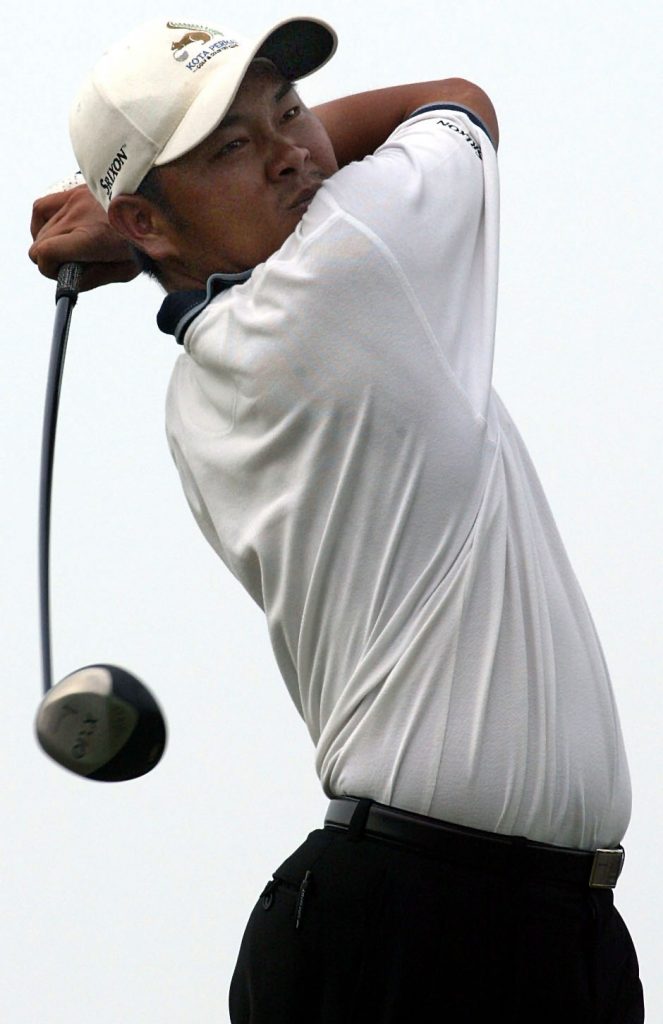
220902 – Asian PGA player Danny Chia of Malaysia tees off at the Acer Taiwan Open on 22 September 2002. Chia won the USD$ 300.000 event at the Sunrise Country Club, Taipei, Taiwan. Picture by Li Tien-chu/World Sport Group.
“It [the weather] was like a typhoon,” says Chia, speaking to the Asian Tour from his home in Kuala Lumpur last week.
“The whole week was like a typhoon and the golf course was very exposed. The course is not difficult, it’s quite a nice golf course to play, but it’s just the wind, and we were very high up in the mountains, which affected things very much.”
Having turned professional in 1996, he had already played in a handful of events on Tour each season up until that point.
And, earlier in 2002 he produced his best finish on Tour when he claimed a sixth-place finish at the Casino Filipino Open to suggest that his fortunes might be on the up.
But after opening rounds of 76, 70 and 77 at Sunrise, he was seven behind leader Hsieh Yu-shu of Chinese Taipei, and on Sunday he was paired in the sixth last group out – with Kao Bo-song (a leading amateur who, a month later, was part of the Chinese-Taipei team that claimed the gold medal in the Asian Games in Busan, South Korea).
Chances of winning seemed very slim but the very poor weather meant Hsieh’s four-shot lead over second-placed American Andrew Pitts was very vulnerable.
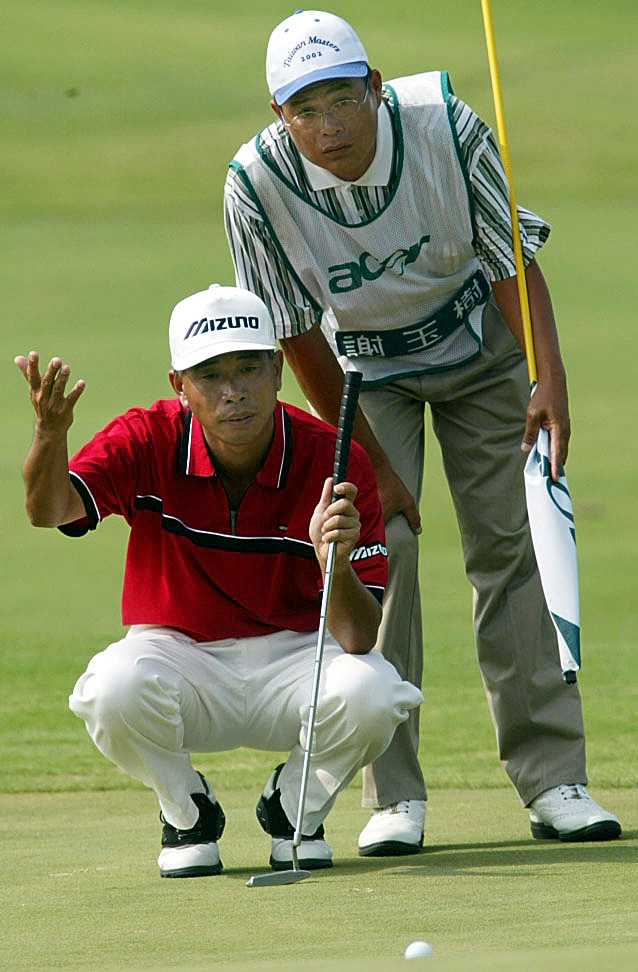
220902 – Asian PGA player Hsieh Yu-shu of Taiwan reads the green with his caddy at the Acer Taiwan Open on 22 September 2002. Danny Chia of Malaysia won the USD$ 300.000 event at the Sunrise Country Club, Taipei, Taiwan. Picture by Li Tien-chu/World Sport Group.
“The weather was bad the whole day, whether you played early or late,” said Chia.
“The front nine I didn’t really think much about it, I was trying to enjoy it. I was hitting the ball well. I was hitting a lot of low shots because of the wind.”
And, this is where the other remarkable element to the story kicks in.
“I just went under Kel Llewellyn at that time. I had only been working with him for about one month and he taught me a lot about playing different types of shots. It really helped when I played that week.
“I was hitting well before heading there. Kel gave me a lot of new stuff to work on. A lot of breathing exercises, a lot of stretching. I used to hit a lot of draw shots, but Kel got me hitting a lot of left to right shots. We worked on the short game a lot and how to hit low ball flight shots.”
The timing of engaging one of the region’s top coaches to teach him to hit shots low could not have been better. And the breathing exercises were just as important as he started to mount a challenge.
“After the front nine, then I saw the leaderboard, and I think I was four behind. I started to get nervous and couldn’t stop looking at the leaderboard. I hit some good shots, but they didn’t quite pay off because the wind was quite strong and tricky. I didn’t hit many greens on the back nine but I had very good up-and-downs on a lot of the holes.”
Incredibly, the record will show that Chia was the only player on that final day not to drop a shot but he did conjure a succession of great saves.
Crucially, he holed a six footer for par on 16 and on the following hole he made a putt to save par from eight feet.
Then, on the par-five 18th, he said: “I think I made the biggest decision of my career”.
“It was dead into the wind. I hit a very good drive, on the left centre of the fairway. The second shot was about 200 metres to the green, but I had to hit over a pond. I was two behind at that time and I told myself ‘this is my chance to win’.
“It is a par-five and I would normally lay up because it was quite a strong headwind but I said this is my chance to win my first title on the Asian Tour and I am going to take it – no matter what the outcome is.”
He went for the green with a four wood. The wind was blowing really hard right to left into his face so he aimed about 20 yards right of the green to let the wind take it.
Rising confidently to the occasion he hit it exactly where he wanted but the wind was so strong his ball flew left of the green.
Said Chia: “But it was over the water! It was a very, very big relief when that happened. I chipped it to about eight or 10 feet short of the hole and I made the putt.”
He said he felt like he signed for a 60 as opposed to a four-under-par 68 – which gave him a four-round total of three-over-par 291.
At that moment he was tied for the lead and opted to wait in front of the leaderboard until everyone finished.
“I watched them come in one by one,” he said.
“I was kind of prepared for a play-off but if I knew then what I know now, I would have realised I had really already won because of the weather.”
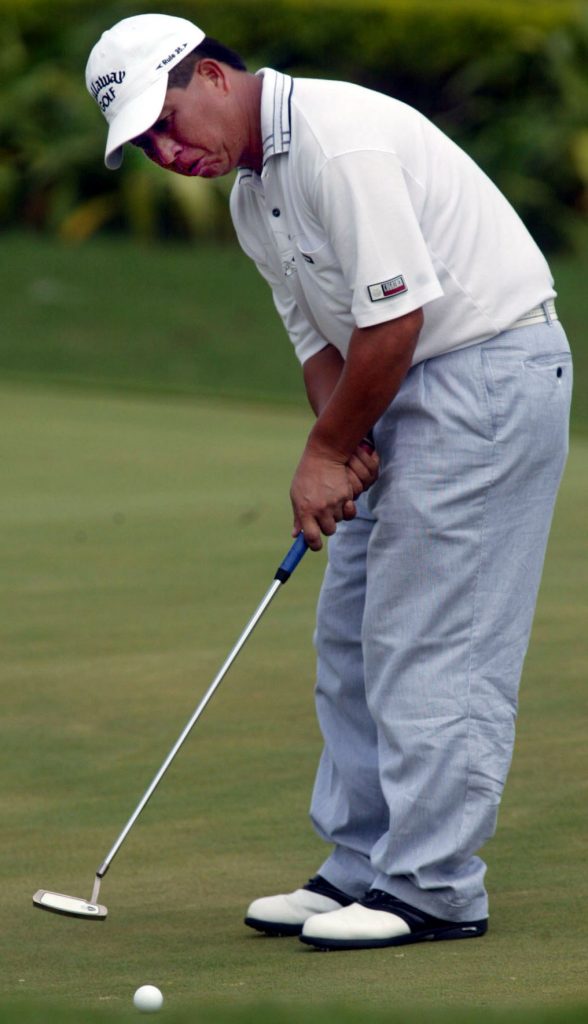
220902 – Asian PGA player lin Chie-hsiang of Taiwan makes a putt at the Acer Taiwan Open on 22 September 2002. Danny Chia of Malaysia won the USD$ 300.000 event at the Sunrise Country Club, Taipei, Taiwan. Picture by Li Tien-chu/World Sport Group.
Chinese Taipei’s Lin Chie-hsiang did his best to catch Chia and toured the back nine in three-under but still fell two short of the Malaysian’s winning total.
And Hsieh, battling the elements, dropped four shots in the last five holes to close with a 77 and join Lin in second place.
“I felt so bad for him [Hsieh] actually,” said Chia, who won a cheque for US$50,000 – a princely sum for a hungry young pro.
“That night I had a good dinner with Wang Ter-chang’s family, but it didn’t really hit me at that time. But at about mid-night before I slept it hit me. I started looking at the trophy and thought, oh god I have won!”
Ends.
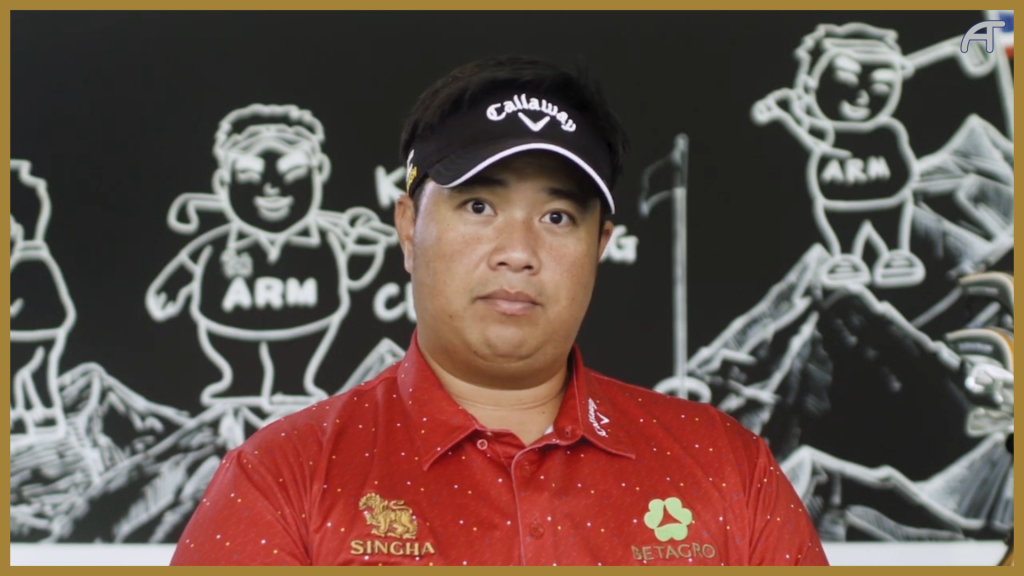
We spoke recently with our 2013 Asian Tour Order of Merit champion, Kiradech Aphibarnrat of Thailand, who shared with us how the Tour has been a springboard to success in his career. The 31-year-old Kiradech is a three-time winner on the Asian Tour and in 2019, he became the first Thai player to earn full membership on the PGA TOUR.
[embedyt] https://www.youtube.com/watch?v=BbyV4DLW_d0[/embedyt]

Jazz has top-50 world ranking back in his sights
By - Serene Loh
[addtoany]

Jazz Janewattananond’s return to form at the weekend will have seen him, and his huge army of fans in Asia, take a huge sigh of relief after a frustrating season so far.
Jazz Janewattananond’s return to form at the weekend will have seen him, and his huge army of fans in Asia, take a huge sigh of relief after a frustrating season so far.
His joint third finish in the Dubai Duty Free Irish Open stopped the bleeding on a poor run of results and will give him much needed confidence heading into the final quarter of the 2020 – which starts this week at the Aberdeen Standard Investments Scottish Open, followed next week by the BMW PGA Championship.
The Thai star came very close to winning the prestigious Irish event and held the lead on the back nine on Sunday at Galgorm Spa & Golf Resort in Northern Ireland. But he dropped shots on the inward stretch to finish three adrift of the winner and fellow Asian Tour member John Catlin from the United States.
Great being back on the @europeantour this week at #DDFIrishOpen ?? and being in contention on a Sunday! Next stop ??????? #seriousface #trustgolf @fashion1thailand #thisisboss https://t.co/gVgeygyO9P pic.twitter.com/ZWHTVLdDZv
— Jazz Janewattananond (@jazzjanegolf) September 27, 2020
Jazz also obviously benefited from having his regular caddie, Camp Pulit, back on the bag having missed his previous few tournaments.
The result also had a significant impact on his world ranking: he moved up from 65th position to 56th and put him back on course to try and better his best placing on the ranking, which was 38th position – which was the result of his brilliant 2019 season.
Getting back into the top-50 – which opens the door to playing in the biggest events in the game – is now well and truly in his sights.
Catlin, whose win in Ireland was his second on the European Tour in September, also enjoyed a significant shift up the ranking, moving from 138th to 84th.
Jazz had started the year on a massive high after winning four times last season en route to winning the Asian Tour Order of Merit title. And a third place finish in the SMBC Singapore Open in January suggested more was to come.

BALLYMENA, NORTHERN IRELAND – SEPTEMBER 27: Jazz Janewattananond of Thailand looks on with his caddie on the 6th hole during Day Four of the Dubai Duty Free Irish Open at Galgorm Spa & Golf Resort on September 27, 2020 in Ballymena, United Kingdom. (Photo by Richard Heathcote/Getty Images)
However, he then missed the cut in seven of the next 11 events he played in; which, in fairness to Jazz, was the result of a change of geographical location and, of course, the upheaval caused by the coronavirus pandemic.
He has been playing on the PGA Tour, through sponsor invites, and also competed in the US Open and US PGA Championship – the event where he famously finish jointed 14th last year.
He missed the cut in both the Majors and also in four out of the other six PGA Tour events he played – although he will have no doubt learned a great deal as he bids to join his countryman Kiradech Aphibarnrat as a full member of the lucrative circuit.
But it was not always a struggle for Jazz in the States.
After bumping into Sweden’s Daniel Chopra – a winner on both the Asian Tour and PGA Tour – at Bay Hill in the week leading up to the Arnold Palmer Invitational in March, the Swede invited Jazz to stay with his family and when lockdown hit because of COVID-19 on March 13, Chopra did not hesitate to invite Jazz and his caddie, Camp, back to his Orlando home to seek refuge.
Earlier in the year he also benefitted from a lesson with Tiger Woods’ putting coach.
After struggling on the greens, Jazz sought the advice of Matt Killen, whose star pupils include 82-time PGA Tour winner Woods and 2017 FedExCup champion, Justin Thomas. It also helped that Jazz is part of the same management stable as Woods and Thomas. Jazz flew to Nashville for a three-hour lesson with Killen.
Ends.

Imagine a golf course consisting of the most iconic and challenging holes on the Asian Tour.
Imagine a golf course consisting of the most iconic and challenging holes on the Asian Tour.
A fictional hybrid-layout that features one of the region’s standout opening holes, one of the finest second holes and goes all the way through to an epic 18th.
A layout that would be the ultimate challenge – where breaking par is a monumental achievement.
Well, just such a virtual course now exists, as an Asian Tour panel of experts has selected the appropriate holes to make up what is the golf course of all golf courses in Asia.
With a par of 70 and length of 7,430 yards, we have appropriately named it The Asian Tour Monster.

To navigate us through The Asian Tour Monster, we asked players and experts to describe each hole – all of which have played key roles in many of the biggest tournaments on the Asian Tour.
Let us know what your think on our social media channels – Facebook, Instagram, Twitter.
Feature: The Asian Tour Monster – Front nine

Taiwan Golf and Country Club
Hole 10 – Taiwan Golf and Country Club
Par: Three
Yardage: 221 yards
Hole scoring average: 3.36
Asian Tour event hosted: Mercuries Taiwan Masters
Hsieh Min-nan, who is one of the true legends of golf in Chinese Taipei, describes this hole as one of the most difficult par-three holes in the world. Considering his lofty standards, this hole is definitely worth including as one of the most difficult on the Asian Tour.
It has a smallish green but it looks tiny when you are standing over 220 yards away, with howling winds holding on to a three-iron or hybrid. You will end up in a deep bunker or a penalty area if you are too far to the left, while a gaping bunker guards the right side of this narrow table-top green, adding to the challenge of this beautiful beast of a hole.
Once you reach the green, you face a putting challenge like no other – the greens at Taiwan Golf and Country Club are renowned for confusing even the best of putters. It is worth noting that during the 2018 Mercuries Taiwan Masters, only seven birdies out of 349 attempts were made on this hole.
“In my opinion it’s the hardest par-three green to hit on the Asian Tour, and maybe in the world! I think I’ve only ever hit the green two times. Most of the time I’m playing to miss the green short because that green is so difficult to hold with a four iron. You can get it up and down from the front part of the green. The best shot I have ever seen on that hole was when I watched one of the Taiwan legends a couple years ago pull out driver and hit this high cut to like 20 feet. It was the best shot I’ve ever seen there. Every time I walk off that green with a par I feel like I’ve made birdie!”
Berry Henson: a winner on both the Asian Tour and Asian Development Tour, who was runner-up in the Mercuries Taiwan Masters in 2018.

Black Mountain Golf Club
Hole 11 – Black Mountain Golf Club
Par: Three
Yardage: 191 yards
Hole scoring average: 3.2
Asian Tour events hosted: Black Mountain Masters, Thailand Classic, King’s Cup, Royal Trophy
This intimidating downhill par-three is the signature hole at Black Mountain Golf Club. It has a narrow double-tiered green, with two-thirds of it surrounded by water. A wall of trees protects the bail out area on the left, ready to deflect any shots hit in this direction back into the water.
According to two-time Asian Tour winner Rikard Karlberg and resident professional, who is also a Black Mountain club member, he says: “Never think about the water as you can lose shots very easily. You just have to aim and hit it straight to the middle of the green and hope for the best”.
“The 11th hole, the signature hole at Black Mountain, has the Black Mountain hill as its back drop. It is a tough green to hit, especially when the wind is blowing.
There is a feeling the green is an island green – even though it is not.
There is no real bail out on this par three as there is water just right of the green and if you were to pull the shot slightly left then there are over hanging trees and a stream where the ball is most likely to end up. The hole certainly is a challenge and if you walk off with par then most people will be happy.”
Simon Yates: is a two-time winner on the Asian Tour and resident at Black Mountain.

Hole 12 – Macau Golf and Country Club
Par: Five
Yardage: 571 yards
Hole scoring average: 5.2
Asian Tour event hosted: Macau Open
This hole demands astute ball control. Being a mountainous course, it can get very challenging with the wind constantly changing directions due to the many ridges and valleys that intersperse the property.
Firstly, a well struck drive is needed to avoid the troublesome fairway bunkers and to carry the ball over water. An accurate second shot is then required to avoid the bunkers guarding the lay-up area and penalty area on the left of this par five, which stretches and rises across the irregular terrain. This sets you up for a mid to short iron approach shot to a severely sloping two-tier green. Being on the correct tier with your approach shot here is paramount as this green has yielded more than its fair share of four-putts.
India’s Anirban Lahiri birdied this hole in the final round of the 2016 Venetian Macao Open – which was the first of an incredible run of seven birdies to force a play-off with Thailand’s Pavit Tangkamolprasert. Pavit eventually prevailed for this first win on the Asian Tour.
“On that final Sunday [in 2016], I used a driver for my first shot on hole 12. This hole is a long par-five – no one can really reach in two. On the second shot I used a hybrid – you just really need to get it on the fairway. Third shot I had about 100 yards left, so I used a 56-degree wedge which I pitched left of the flag and then made about a six yard putt for birdie. The hole is not as tough as 13, but the green [on hole 12] is very tough, especially if the pin is on the back as there is a huge slope.”
Pavit Tangkamolprasert – a two-time champion on the Asian Tour, and winner of the 2016 Venetian Macao Open.

Hole 13 – TPC Kuala Lumpur (West course), Malaysia
Par: Four
Yardage: 459 yards
Hole scoring average: 4.38
Asian Tour event hosted: Malaysian Open
You will need both length and accuracy with your tee shot to play this hole – which is a lengthy uphill hole. A penalty area on the right and thick rough up the left side await wayward drives. A solid mid to long iron is then required to reach the elevated green. The right side of the green is preferred as deep bunkers guard the left side of the long and narrow green. Club selection will be important as the green has three tiers and any mis-clubbed approach shot can result in possibly having to negotiate some lengthy winding putts. Downhill putts will be especially challenging.
“I hit driver off the tee here, making sure I start my ball on the left side of the fairway. On this hole, the one place you don’t want to go is right. I try and hit a little fade as well. Most important is to keep it on the fairway. The toughest part of the hole is the second shot. There is a very high elevation, maybe about seven or eight metres up hill. I normally have a six iron in. I try to hit a draw as, if anything, you want to miss on the right side of that hole. If I walk away with par I will be very happy. So far I have played this hole well in tournaments, with a couple of birdies.”
Danny Chia: a two-time winner on the Asian Tour and four-time champion on the Asian Development Tour.

NEW DELHI, INDIA – MARCH 29: David Law of Scotland tees off the 14th hole during round two of the Hero Indian Open at the DLF Golf & Country Club on March 29, 2019 in New Delhi, India. (Photo by Ross Kinnaird/Getty Images)
Hole 14 – DLF Golf and Country Club, India
Par: Four
Yardage: 535 yards
Hole scoring average: 4.53
Asian Tour events hosted: Hero Indian Open, Avantha Masters, Johnnie Walker Classic
The 14th hole at the Gary Player-designed DLF Golf and Country Club is just a ruthless golf hole. Long is an understatement when describing this par-four which demands two massive and precise shots to reach the green. Adding to the challenge is the forced 250-yard carry off the tee over dense scrub that runs down the entire left side. Once you have the green in your sights, you will be faced with a downhill lie and needing at least a long iron to reach an elevated green with steep fall offs on either side.
It is a hole that probably cost American Julian Suri the Hero Indian Open title last year. Suri had a three-shot lead with six holes to play but made a quadruple-bogey eight, after taking six shots to get down from just off the green. He eventually had to settle for a share of fourth place.
“Normally when we play this hole, it is a par-four, otherwise for the club members it is a par-five. My personal view about that hole is that it is the toughest hole on the golf course and one of the hardest in the region. Firstly, for your tee shot you can’t hit a driver, some people do, because it is very narrow and there are some rocks placed beautifully on the right side of the fairway. Then you need to use anything from a rescue to a three-wood to a three iron depending on where your ball ends up, to a green that is a very narrow. You also come in from an angle – the green is basically towards the left side when you are standing in the middle of the fairway. Plus there is a huge swale before the green and on the right hand side of the green. And the green slopes left to right towards the swale. So it is difficult to stop the ball on the green unless you hit a high ball. Even if you try and hit a low shot and run it up you have to hit it way left because the green is all left to right and you have to have a perfect bounce.
If you go into the swale on the right … well the swale is at least 15 feet deep. During the tournament 80% of the golf balls end up there, even though players think their ball is on the green but everything slopes into the swale – where there are a lot of pitch marks. You want to make sure you hit a high lofted second shot onto the green, so it stays on the green. Some people try and take it left of the green but then what happens is it takes a big bounce and goes to the left hand side and you are left with a downhill chip and from there most of the time people chip it over into the swale on the right. Management is very important. A par on that hole is a bonus and you want to make the most of it and if you try and get too smart just try and make a bogey and move onto the next hole. I have never made a birdie there in tournaments, made a double once but normally pars or bogies.”
Jeev Milkha Singh: a two-time Asian Tour Order of Merit champion, and five-time winner on the Asian Tour. He has also claimed four titles in both Europe and Japan.

Hole 15 – The Serapong, Sentosa Golf Club, Singapore
Par: Four
Yardage: 429 yards
Hole scoring average: 4.20
Asian Tour event hosted: SMBC Singapore Open
A very intimidating par-four and one that enhances Serapong’s reputation as a true championship layout. The fairway is extremely narrow with a sea channel running all the way down the left side of the hole, where a countless number of balls have found a watery grave. It is also a long par-four that requires full concentration.
“The 15th is a really good hole. Visually intimidating off the tee, it is probably the most difficult tee-shot on Serapong, after the third hole.
I usually aim at the second bunker on the right with a three wood and play a draw. The reason for a draw is that in the worst case if you overdraw it and it ends up in the water you can at least drop the ball up in the fairway and still have a shot at the green. I have seen many players pull it straight left into the sea and have to drop the ball very near from the tee box … it’ll almost always be an automatic double when that happens.
If you are able to hit the fairway, I would say the hole becomes straight forward from there, but I have seen a lot of bail outs to the right.
If you are in the right rough, the second shot becomes tricky as you have to contend with the trees to carry for your approach.
A back left pin is the most difficult pin position on this hole. When the pin is there, we usually just aim for the middle of the green… if not you’d have to contend with the bunker and also water if you go long and left.
The majority of players will a hit fairway wood off this tee, however, there was one round when I played with Phil Mickelson and he pulled out a driver, hit it about 30 yards right of the fairway into the trees, but he was able to hit a really high shot over the trees and get away with par.”
Lam Chih Bing: a winner of 10 titles in the region including one victory on the Asian Tour at the Volvo Masters of Asia in 2008.

Hole 16 – Namseoul Country Club, Seoul, Korea
Par: Four
Yardage: 533 yards
Hole scoring average: 4.75
Asian Tour event hosted: GS Caltex Maekyung Open
The 16th hole is a straight and long downhill par-four with OB all the way down the right. It requires precision off the tee to a narrow fairway guarded by bunkers on the left and at the end of the landing area. A long iron or hybrid will be needed for your approach shot, however the downhill lie will hinder your efforts at keeping the ball on this green. Bunkers short and over the green are always in play with the OB once again in play down the right.
Prior to the 2017 edition of the GS Caltex Maekyung Open, this hole was played as a par-five for the tournament. After changing to a par-four, it has since become the toughest hole of the tournament for the last three years.
“Nam Seoul’s 16th hole is the hardest hole on the course. On the tee I usually hit five-wood or hybrid depending what club I use for that week. You want to hit something around 260 yards so you are just short of the fairway bunker and not too far from the hole.
I usually have about 200 to 215 for my second depending on how well I strike it. Most of the time I will use a five iron to this green. This hole is so hard because you will have to hit your second shot from a downhill slope, which it makes it so hard to stop the ball on the green, and there are two deep bunkers around the green. This hole is so hard that when I make par on this hole I feel like I made a birdie. One interesting story that I have involves the first round from last year. I had an afternoon tee time and I was playing well and I believe I was leading the tournament at that time, until the 16th hole. I don’t know what happened but I ended up making a quadruple bogey and everything went south from that point…”
Yikeun Chang: winner of the 2019 Yeangder TPC and the 2016 Qualifying School. He was also runner-up at the GS Caltex Maekyung Open in 2018.

Hole 17 – Royale Jakarta Golf Club, Indonesia
Par: Four
Yardage: 459 yards
Hole scoring average: 4.29
Asian Tour event hosted: BNI Indonesian Masters
The 17th hole is a lengthy par-four at Royale Jakarta Golf Club. To master this challenging hole, you need to execute a well-struck tee shot to a less than generous fairway. A penalty area that runs all the way down the right and thick rough down the left will definitely test your nerves. And depending on the wind direction and quality of your tee shot, the approach shot can be with anything from a short-iron to a long-iron, to an undulating green that is guarded by a bunker on the left and water short and to the right of the green.
“That is a great hole, it is definitely one of the most challenging holes, especially for the 17th hole of a golf tournament. For the longest time, I have always played that hole hitting three wood over the little bunker in the middle there because to me it’s the widest part of that fairway, although it is not very wide to begin with. Once you get up to 290 to 300 yards that’s where the fairway gets narrower. Typically the rough has always been thick at Royale Jakarta but the last few years it hasn’t been so, so it’s been manageable. Teddy [Teddy Harmidy his friend, and caddie at the 2019 BNI Indonesian Masters] had me try and hit driver there when we were preparing for the tournament, a few months before. He said if I am going to caddie for you I want you to try this. So I did that and hit it out there and once I saw where my ball ended up, even if it wasn’t in the fairway, I realized I am only hitting a nine iron at most into the green. Normally with a three wood off the tee I am hitting maybe a six, seven or eight iron into the green. So it’s been an ongoing debate, what’s more important? Hitting in the fairway or long. So I started to change my mind set. And I started to realize I do hit it quite far so I should take advantage of that on some of these longer holes, even if you are going to be in the rough. The green slopes left to right and so anything left of that green is dead. Where they put the pins there is quite challenging. I actually bogeyed it the first two days last year and birdied it the third round and parred on the last day. You need to hit a good second shot with that green. There are not many flat spots on the green, maybe one. A par on the hole is very good.”
Danny Masrin: a seven-time winner on the PGA Tour of Indonesia, who finished equal fifth in the 2019 BNI Indonesian Masters.

HONG KONG- The Hong Kong Open at the Fanling Golf Club, Fanling, Hong Kong, the Asian Tour USD$ 1 million event is the season opener. Picture by Paul Lakatos / Asian Tour.
Hole 18 – Composite Course, Hong Kong Golf Club
Par: Four
Yardage: 410 yards
Hole scoring average: 4.281
Asian Tour events hosted: Hong Kong Open, Alfred Dunhill Masters, Johnnie Walker Classic
Known as “The Ultimate”, this is the closing hole on the Eden Course at the Hong Kong Golf Club and also the final hole of the Composite Course – a famous layout consisting of the best holes of the Eden and New Courses, specifically configured for the Hong Kong Open.
It is a hole deeply ingrained in the rich history of Asian golf, and viewed as one of the great amphitheatres of tournament golf globally.
Though not a long par-four, by modern-day standards, it demands the utmost respect, and requires the fullest care and consideration.
The hole’s statistics at this year’s Hong Kong Open, tell a familiar story: measuring 410 yards, it was ranked the second hardest with an average score of 4.281; there were just 40 birdies, 215 pars, 101 bogeys, 19 double-bogeys and two “others”.
Off the tee, most players will favour a long iron to the widest part of the fairway on the left. However, if you are brave enough, you can choose to go with a three-wood or driver and attempt to thread the ball through the narrowest part of the fairway to set up an easier approach shot. With trees and OB threatening on the left and a dense cluster of trees and bunker to the right of the fairway, it is risk verses reward.
Having chosen your strategy and, hopefully, successfully executed it, it is time to take on the green. Although the elevated green is large, it is severely sloped from back to front, so it is always preferred to be putting from below the hole. There is a large lake in front of the green with bunkers the front and right. And any shot missed left will leave you in gnarly rough with a slim chance to get up and down.
It has been the setting for a wealth of gripping and well-documented drama over the decades.
Who can ever forget the heroics of Lin Wen-tang’s memorable play-off victory over Francesco Molinari and Rory McIlroy at the Hong Kong Open in 2008. Lin produced one of the finest shots ever seen on the 18th: after hooking his tee shot, he played a spectacular approach out of trees, over water, and a bunker, to within inches of the pin.
And, in 2011, McIlroy recorded his maiden triumph at the Hong Kong Open in remarkable fashion when he holed out from a greenside bunker at the last to finish two shots clear of France’s Gregory Havret.
“I usually hit three-wood these days, try to hit a fade off the trees on the left but usually end up in the trees! At the Hong Kong Open in 1996, I hit a two-iron off the tee and then an eight-iron to about 12-feet. I made the birdie putt to finish fourth.
In the 1996 Alfred Dunhill Masters I holed a bunker shot from the right bunker for birdie to finish T11, I think. There were massive crowds that year. Langer, Els, Ballesteros and Monty were all playing. There must have been 20,000 people there that day.”
Dominique Boulet: a former Asian Tour player and Hong Kong number one. Now a highly respected television commentator and long-time member of the Hong Kong Golf Club.

Anirban Lahiri felt so confident that he did not book a return ticket home but instead booked himself on a charter to the next venue.
By V.Krishnaswamy, @Swinging_Swamy
Anirban Lahiri felt confident even before he teed up last week at the Corales Puntacana Resort & Club Championship so much so he did not book a return ticket home but instead booked himself on a charter to the next venue. Yet, he found himself four-over after the first three holes, before beginning a terrific fightback and finished tied-sixth at the end of the event at Punta Cana, Dominican Republic.
Lahiri was amply rewarded for the way he backed himself as he shot 2-under 70 on the final day to total 13-under for the week and finish T-6, his first Top-10 in almost two years since the T-10 in the Mayakoba Golf Classic in Mexico in November, 2018. He was also T-6 at WGC-Bridgestone in August, 2018.
Hudson Swafford (69), who at one stage held a four-shot lead managed to hang in and fend off Tyler McCumber (66), who played with Lahiri, to win the title. Swafford totalled 18-under, one ahead of McCumber, while Mackenzie Hughes (70) was third at 16-under.
Swafford’s second PGA Tour win, the first since 2017, earned him 500 FedExCup points and entries to the Sentry Tournament of Champions, 2021 Masters Tournament, THE PLAYERS Championship and PGA Championship.
While Lahiri logged a fine finish, his colleague Arjun Atwal (77) slipped and ended T-70. What was even more pleasing for Lahiri was that the Top-10 finish ensured him a spot in next week’s Sanderson Farms Championship.
Lahiri said, “Well, I did not book a return flight and I booked myself on the charter (to the next venue), so this is going to be good for my confidence because I backed myself to do this.”

PUNTA CANA, DOMINICAN REPUBLIC – SEPTEMBER 27: Anirban Lahiri of India plays his second shot on the eighth hole during the final round of the Corales Puntacana Resort & Club Championship on September 27, 2020 in Punta Cana, Dominican Republic. (Photo by Andy Lyons/Getty Images)
About next week’s Sanderson Farms, an event he has played in the past, Lahiri said, “I wasn’t in (he was the ninth alternate at one stage). Now this (Top-10) gets me in.”
Lahiri had the second highest number of birdies this week at 22 and led the field in putts per Greens In Regulation.
On Sunday, Lahiri made birdies on sixth, eighth, 12th and 15th and dropped shots on third and 11th.
Lahiri, who did not have taken advantage of any of the Par-5s on the final day, said, “I felt really good after my first event in Napa. I had two really good rounds to finish that event as well, so I got it rolling here with some of that. Definitely I’ve managed to build that snowball and build some momentum. Hopefully I use this going forward and kind of keep this going and maybe even play a little better.”
It was a disastrous start for Lahiri on the opening day as he had a triple bogey on the second and a bogey on third to go 4-over through his opening three holes. He fought back with an eagle and a bunch of birdies and finished the first round at 69 and 72 on the second saw him make the cut on the line at 3-under.
It was Saturday’s flawless 64, that ironically included a 3-putt, which brought Lahiri into the picture.
Lahiri admitted, “The last couple of seasons, I’ve been very disappointing, and where I find myself in my eligibility is not great, so I need to play myself into some of the events that I like to play. Definitely have a lot of opportunities in the fall that I need to take and build on that. Hopefully get closer to being really in contention on Sunday. I’ve had outside chances, but the goal is to kind of get to the last few with a realistic chance or maybe even a lead.”
Meanwhile, China’s Xinjun Zhang, who started the final round in fourth position, endured a disappointing final round as he closed with a 74 to finish tied 11th, his second top-15 finish of the 2020-21 PGA TOUR Season after coming in T14 at the Safeway Open two weeks ago.
Joohyung Kim (72) was T-33 and Kiradech Aphibarnrat (69) ended T-70 alongside Atwal.
Nate Lashley (69) was fourth and overnight leader, Adam Long (75) fell to fifth. Lahiri tied for sixth with James Hahn (69).
Ends.

American John Catlin completed a memorable day for members from the Asian Tour on Sunday by winning the Dubai Duty Free Irish Open at Galgorm Spa & Golf Resort.
American John Catlin completed a memorable day for members from the Asian Tour on Sunday by winning the Dubai Duty Free Irish Open at Galgorm Spa & Golf Resort.
It was his second win on the European Tour in the space of four weeks and will see him add the prestigious title to an impressive trophy cabinet that also includes the silverware from four wins on the Asian Tour and two triumphs on the Asian Development Tour.
Thailand’s Jazz Janewattananond, last year’s Asian Tour Order of Merit champion, also excelled by finishing in a tie for third while Scott Hend from Australia – the winner of 10 titles on the Asian Tour – was equal 11th, with another Asian Tour winner Justin Harding from South Africa.
Catlin, voted the Players’ Player of the Year on the Asian Tour thanks to three victories in 2018, birdied three out of the last four holes to card a brilliant closing six-under-par 64 – for a tournament total of 10 under.
He won by two from England’s Aaron Rai – the overnight leader – to earn €199,750 (approximately US$ 232,356).
Earlier in the month, the American held off two-time major champion Martin Kaymer from Germany to win his maiden European Tour title at the Estrella Damm N.A. Andalucia Masters at Valderrama Golf Club in Spain.

Antrim , United Kingdom – 27 September 2020; John Catlin of USA watches his drive from the 16th tee box during day four of the Dubai Duty Free Irish Open Golf Championship at Galgorm Spa & Golf Resort in Ballymena, Antrim. (Photo By Brendan Moran/Sportsfile via Getty Images)
“I’m so happy. I was talking to someone earlier about where I was at four years ago and to be here is so surreal and a testament to my coach and all the hard work we put in. It’s so awesome to just be here,” said Catlin, whose most recent win on the Asian Tour was last year’s Thailand Open.
“There are so many years of hard work that have gone into this moment. It was my goal to win again at the start of this week so to accomplish that is to do something truly, truly special.”
He only dropped one on the last day, at the 13th, and birdied seven holes, including the par-five 18th.
“You never know if you’re going to win or not and to get that monkey off my back at Valderrama really freed me up today to know that I can look myself in the mirror and tell myself honestly that I’ve been here before and I can do it again,” added the 29-year-old Californian.
“I’ve always wanted to play in the Majors, that’s the only level of golf that I haven’t played at and hopefully one day I can win one of those as well.”
He will play in the Aberdeen Standard Investments Scottish Open this week, followed by the BMW PGA Championship.
Jazz, a six-time winner on the Asian Tour and chasing his first win in Europe, closed with a fine 69, to finish three behind Catlin.
The Thai star birdied the tenth to take the solo lead but later made a costly double on 14 after taking a drop.
Over at the Corales Puntacana Resort & Club Championship, India’s Anirban Lahiri came in tied-sixth after closing with a two-under-par 70, marking his first top-10 finish on the PGA TOUR since the 2018 Mayakoba Golf Classic (T10). He earns a spot in this week’s Sanderson Farms Championship thanks to the commendable result.
Korea’s Joohyung Kim settled for a tied-33rd place finish while Arjun Atwal of India and Thai star Kiradech Aphibarnrat were tied in 70th position.
Ends.

Kota Permai Golf & Country Club, the tournament’s venue, has been the proud host of events on the Asian Tour since first staging the Volvo Masters of Malaysia in 1998 – the year the club opened.
When American rookie Trevor Simsby holed a four-foot birdie putt to beat Andrew Dodt, from Australia, in a sudden-death play-off at the Bandar Malaysian Open in March, it not only sealed his first win on Tour but the occasion also helped cement an important relationship that has lasted over two decades.
Kota Permai Golf & Country Club, the tournament’s venue, has been the proud host of events on the Asian Tour since first staging the Volvo Masters of Malaysia in 1998 – the year the club opened.
And over the past 22 years it has staged a wealth of Tour events, including: two Malaysian Opens, the Selangor Worldwide Masters twice, six Volvo Masters and a pair of World Cup Qualifiers.
It has been a special venue on Tour ‒ something that Thailand’s Thaworn Wiratchant will agree with having won the 2001 Volvo Masters of Malaysia and Selangor Worldwide Masters in 2012 on Kota Permai’s pristine playing surfaces.

Hole No. 2 at Kota Permai GCC
Many will also remember American Kevin Na ‒ aged just 19-years-old ‒ winning the Volvo Masters of Asia at Kota Permai in 2002, before departing on a highly successful and lucrative career on the PGA Tour.
In August, the popular Kuala Lumpur venue took another exciting step forward with its’ Tour association by becoming part of Asian Tour Destinations – an exclusive network of world-class golf venues, with direct ties to the Tour.
The other current Destinations venues include: Sentosa Golf Club in Singapore, Black Mountain Golf Club in Hua Hin, Thailand, and the Classic Golf & Country Club in New Delhi, India. Additional world-class Destinations will be added to the network over the coming months.
The Asian Tour Destinations brand offers a wide range of benefits to its members and the Tour, helping them to achieve their commercial and strategic goals.
It provides an affiliate membership programme between the associated venues – which have a collective membership base of 7,500 golfers.
Also, being a part of the network means that each venue is certified Tour calibre and operates a comprehensive range of facilities and services to their members and guests under tournament-ready conditions all-year round.
Among the core benefits, Asian Tour members will be able to play and practice at each venue – allowing for the members at each club to enjoy direct engagement with the region’s best golfers.
“This is a very exciting development – one we have eagerly been anticipating. In terms of what we are looking forward to, it is pretty much threefold,” says Tang Meng Loon, Director of Club, Township & Property Management at Gamuda Land – the owners of Kota Permai.
“Firstly, more involvement with the Asian Tour – to be a host venue for tournaments or a platform for any programmes sanctioned by the Tour.
“Secondly, seeing Tour players here at Kota Permai away from tournaments will be amazing. We will be able to get their feedback for improvements, plus members and guests will really enjoy seeing them here, whether playing, practicing or socializing in the clubhouse. It’s going to be great to see them here and it will definitely increase interest to play here.
“Thirdly, we will be able to foster interclub relations with the management teams of the other Asian Tour Destinations’ partners, exchange advertising and promotion support, and welcome their members to Kota Permai, relishing the chance to host them.”

Hole No. 16 at Kota Permai GCC
In addition, by aligning themselves to an even greater degree with the Asian Tour, the club are hoping to achieve one of their key objectives: to see their venue continue to rise from being one of Malaysia’s top golf club’s – a position it proudly holds today – to one of the premier golfing Destinations in the region.
“We want to provide the best possible experience to all who walk through our doors and we want to constantly improve in all areas. With Asian Tour Destinations, this is now very possible,” added Tang.
The club currently has over 4,000 members and averages 5,900 rounds a month. And it is well known for being the ultimate recreational hub, for as well as boasting an 18-hole golf course – designed by Ross Watson – it also has a pro shop, driving range, gymnasium, badminton, squash and tennis courts, swimming pools, sauna and steam baths, F&B outlets, function rooms, and a children’s playground.
Says Tang: “We have a constant drive to improve in all areas – whether it be in operations, branding, marketing, strategic partnerships, or administration.
“We are continuously working on the maintenance and upgrade of the golf course, plus the provision and upkeep of world-class club facilities and amenities that offer excellent customer service.”
This policy of progression has resulted in the club being the recipient of a host of important accolades – including the coveted “Malaysia’s Best Golf Course” award in 2014, 2016, 2017 and 2018 at the World Golf Awards. And, it has also earned similar honours at the Asian Golf Awards over the years.
And, the club have weathered the storm caused by the coronavirus pandemic by gradually resuming business.
“As per government directives, we had to close the club and cease all operations earlier in the year. Since the beginning we have followed the strict standard operating procedures but we are delighted to say we are almost back to normal – just operating under the ‘new norm’ of things,” said Tang.
Simsby, for one, will be happy to hear that.
Said the American after his win: “I really felt good about the golf course, and was in awe of how good the condition was. It was in tremendous shape all week.”

Trevor Simsby of the United States

Thailand’s Gunn Charoenkul says two wins in quick succession on the Thailand PGA Tour recently were the result of a new positive mindset, as well as a little inspiration from his new paternal responsibilities.
Thailand’s Gunn Charoenkul says two wins in quick succession on the Thailand PGA Tour recently were the result of a new positive mindset, as well as a little inspiration from his new paternal responsibilities.
He won the Singha-SAT Hua Hin Championship in July for his first victory in five years and then two weeks later claimed the Singha-SAT Nakhon Nayok Classic.

“I really needed a win as it had been four or five years,” said Gunn.
“So the mind set on the last day was to play my own game and just keep thinking about winning and just keep myself in the zone. Be relaxed all the time.”
He beat countryman Prom Meesawat by six strokes at Royal Hua Hin Golf Course before overcoming compatriot Nirun Sae-Ueng in a sudden-death play-off in the Nakhon Nayok Classic – played at Royal Hills Golf Resort & Spa.
“I was pretty nervous because I was playing with Prom at his home course, and he pretty much knew all the nooks and crannies of the course,” said Gunn.
“I had a five shot lead on the last day. All of Proms shots were pin high and close but I was fortunate he didn’t make any putts. But I didn’t trust myself at all because I was close to victory.
“My last victory five years ago, I finished with a bogey, or a double, and then a playoff. So it wasn’t until the last, when I had a six shot lead, that I felt confident I can take the trophy home.”
At Royal Hills, he trailed Prayad Marksaeng by three shots on the back nine and felt the legendary Thai star would run away with the tournament.
“I thought maybe finishing third would not be too bad,” said Gunn.
However, Prayad had a hiccup on 16 where he made a double before dropping a shot on 17.
“I had a 20 footer on 18 for birdie to make a play-off. But I never had a good experience when I needed to hole an important putt. So I didn’t take it that seriously and thought I would miss it. And I misread the putt but somehow I made it,” added the Thai.
Niran found water with his second when they returned to 18 for the play-off leaving Gunn in the drivers’ seat.
“I told myself just hit the green otherwise it is going to be a long day. I hit it on the green and made my birdie putt so it was all over. It was a breakthrough for me as when I lost a lead in the past I never made a comeback. So this was the first time for me. So I guess if there is a next time I can believe there is a chance I can win again,” said Gunn.

His wife Koyy gave birth to their daughter, Vera, in February and he feels that has also helped to put a better complexion on things.
He says: “It has made a big difference to my life. I don’t really have any time for myself now. All my time goes to her. I keep myself busy, doing laundry, cooking her food, doing kids club, swimming class. So it is a new experience for me. I have always been pretty introvert, just happy staying home, but now I am going out and seeing the world.
“I don’t get to practice so much but it does take my mind off the golf game a bit. If I get a chance I can check my swing in a mirror. It has really helped to relax myself a bit.”
Gunn was in brilliant form last year on the Japan Golf Tour Organization – he finished 21st on the Money List with 10 top-10s – and made an outstanding start on the Asian Tour this year: he was third in the Hong Kong Open and reached ninth place on the Order of Merit before the Tour was put on hold by the coronavirus pandemic.
“My mentality before was I never really appreciated the small things in my life, but now I do and I feel very happy. And all the happy little things add up so when I am on the course I feel very relaxed. Just in my own comfort zone. To perform well, you have to find your own comfort zone, to perform at your best.”
Ends.

Anirban Lahiri and Arjun Atwal will tee up together in the same group at the Corales Puntacana Resort & Club Championship starting on Thursday.
By V.Krishnaswamy, @Swinging_Swamy
Anirban Lahiri and Arjun Atwal will tee up together in the same group at the Corales Puntacana Resort & Club Championship starting on Thursday. While Lahiri, who was T-36 at Safeway Open, makes his second start of the season, Atwal, who played four events when golf returned after the hiatus due to Covid-19, makes his first start of the new season. They are grouped together alongside David Hearn in the Dominican Republic.
There is more Indian connection, as the field also includes two-time PGA Tour winner, the Indo-Swede Daniel Chopra, a great friend of both Lahiri and Atwal. Yet another one in the field is 18-year-old left-hander Akshay Bhatia, who is of Indian origin, but was born and brought up in the United States, and is now mentored by Phil Mickelson.
Lahiri and Atwal go off together at 11.30 am local time on first day, while Daniel Chopra plays with Johnson Wagner and Seamus Power in one of the earliest groups at 6.50 am, and Akshay Bhatia plays with Ted Purdy, who an Asian Tour event in India in 1997, and Joseph Bramlett at 8 am.
The Asian Tour flag will also be flown by Kiradech Aphibarnrat and Joohyung Kim and Kurt Kitayama this week.
Lahiri was happy with his start at Safeway Open and is hoping to gain further momentum, as he makes his debut at the Corales Puntacana Resort & Club Championship in the Dominican Republic.
A confident Lahiri, said, “The game feels really good at the moment. Safeway was a good confidence booster as after the bad start, I was able to finish strong which felt great.”
Playing in his sixth season on the PGA Tour, Lahiri had done well to recover from a first round 74 at Safeway to add rounds of 65, 67 and 70. It was his best finish since T30 at the Valspar Championship in March, 2019 and his second round 65 was his lowest score since shooting the same number during the second round of the John Deere Classic in July, 2019.

GREENSBORO, NORTH CAROLINA – AUGUST 13: Anirban Lahiri of India plays his shot from the 18th tee during the first round of the Wyndham Championship at Sedgefield Country Club on August 13, 2020 in Greensboro, North Carolina. (Photo by Jared C. Tilton/Getty Images)
“I spent a lot of time during lockdown in India, where I went for Hero Indian Open (his last win came at the same event in 2015) but with it being cancelled and the lockdown happening I stayed on in India with the family. And I returned for just one event, Wyndham, in the previous season and then the Safeway. So, I rested and also worked during my downtime at home with my coach Vijay Divecha,” said Lahiri, a former two-time Presidents Cup International Team member. “We worked on various aspects, broke down everything and did a lot of work on swing and re-built it in a way.”
Lahiri, who is making his first trip to the Corales Golf Club, which has six holes that run along the Caribbean Ocean, said, “The golf course here reminds me of my days on the Asian Tour. Similar grasses and temperatures and conditions to what I played for years back home. Definitely a feeling of familiarity even though it’s my first time here.”
Atwal, India’s first and only winner to date on the PGA TOUR, is seeking a strong start to the 2020-21 season. He played in four events when golf returned to action during the pandemic. He made cuts in three of them, and missed only once in Wyndham, an event he won in 2010.
“It felt good during that stretch and playing four times in seven weeks also gave me an idea of my strength, because during practise rounds, we mostly use carts. I am proud that I held up at 47,” said Atwal with a characteristic laugh. “It will be great to play with Anirban. It is like playing at home and in a great atmosphere and the venue itself is superb. I am looking forward to this.”
The field has some familiar Asian Tour names like Kiradech Aphibarnrat and Kurt Kitayama.
The highest ranked player in the field Henrik Stenson at No. 43 and it also includes the defending champion Graeme McDowell, who while winning the 2019 edition ended a five-year-long PGA Tour title drought, though he won in February this year. He has however missed seven cuts in his last nine starts since the Tour re-started in June.
One of the most keenly watched players will be Will Zalatoris, who in his first start on PGA Tour since Wyndham 2018, finished T-6 at the US Open at Winged Foot. This Korn Ferry graduate is the one to watch for in the near future.
Ends.

As if the fledgling career of Korean teenager Joohyung Kim could not get any more exciting, this week he tees-off in the Caribbean at the Corales Puntacana Resort & Club Championship – in the Dominican Republic.
As if the fledgling career of Korean teenager Joohyung Kim could not get any more exciting, this week he tees-off in the Caribbean at the Corales Puntacana Resort & Club Championship – in the Dominican Republic.
And in what is only his third start on the PGA Tour, there is one thing he is focused on.
“It’s what I’ve learned from my past couple of events,” said Kim, at his first virtual press conference on the PGA Tour.
“I think that’s my goal this week, just play really smart, take advantage when you can, not to get too aggressive, just play my own game. And that’s always been me.”
In August, he made his debut on the PGA Tour at the PGA Championship – where he missed the cut in what was also his first appearance at a Major championship.
But two weeks ago at the Safeway Open – the opening event of the 2020/2021 season – impressively, he played all four rounds shooting 67, 72, 75 and 70 to finish in a tie for 67th on four under.

HONG KONG- The Hong Kong Open at the Fanling Golf Club, Fanling, Hong Kong, the Asian Tour USD$ 1 million event is the season opener. Pictured by Paul Lakatos / Asian Tour.
“Sometimes you get gnarly lies here and just tough pins, sometimes you just really have to take your medicine, just make a good bogey instead of like at the Safeway Open. I remember I shot five under the first round, gave myself a good chance, so kind of felt like I wanted to keep shooting under par. I went for a lot of pins which I shouldn’t have, I was playing really aggressive and I feel like sometimes you don’t need to do that,” added the Korean, who is just 18 years old.
“I feel like I was pushing myself a lot and I made a lot of soft bogeys and a lot of mistakes. I didn’t really have the week that I wanted. Even in the PGA Championship, I just kind of pushing too hard. And, you know, with the conditions, sometimes a soft bogey is okay.”
At the PGA Championship he shot rounds of 70 and 77 to miss the cut by six.
Last year, after earning a battlefield promotion from the Asian Development Tour by winning three events, the youngster made an instant impact by winning on just his third start on the Asian Tour at the Panasonic Open India.
That made him the second youngest professional to win on the Asian Tour at 17 years and 149 days, with countryman Seungyul Noh being the youngest when he won the 2008 Midea China Classic at the age of 17 years and 143 days.
When asked about his long-term ambitions in the game, the confident Korean did not beat around the bush.
“I really would love to be world number one. That has always been like a goal just because Tiger Woods was so dominant as world number one for so many years. So that has always been like a major thing for me.
“I would obviously love to play on the PGA Tour, win all four majors, be in the Golf Hall of Fame – just those big things I always would love.”
And when asked how his English name, which is Tom, came about, he replied: “Actually, it was actually Thomas. I got it from Thomas the Train [Thomas the Tank Engine television series] when I was young. As I grew older, some people started calling me Tom and I thought it was just shorter and just simpler. I think by the time I was like 11, I went just by Tom. My brother even calls me Tom. It was kind of natural. And my family calls me Tom as well, my friends all call me Tom, so it kind of came natural to me. It was that kind of a name. I had the whole thing, I had the lunchbox, I had the toys, yeah.”
This week, he has been paired in the first two rounds with Swede Carl Pettersson and Michael Gligic from Canada, at 1pm local time in the Dominican Republic.
Ends.

Chinese Taipei’s Wang Ter-chang has achieved so much in the game, including six victories across the region, but ‘not a lot of people know that’ he also made an important contribution to Malaysian golf.
Chinese Taipei’s Wang Ter-chang has achieved so much in the game, including six victories across the region, but ‘not a lot of people know that’ he also made an important contribution to Malaysian golf.
On this day 18 years ago, Danny Chia made history by becoming the first Malaysian to win on the Asian Tour – a long-awaited and monumental achievement.

220902 – Asian PGA player Danny Chia of Malaysia pictured with the Acer Taiwan Open trophy on 22 September 2002. Chia won the USD$ 300.000 event at the Sunrise Country Club, Taipei, Taiwan. Picture by Li Tien-chu/World Sport Group.
He did it at the Acer Taiwan Open, played at Sunrise Golf and Country Club in the hills of Northern Taiwan, in dramatic circumstances emboldened in the annals of Asian golf.
And what role did Wang play? Well, he kindly let the young Malaysian stay at his home for the week; no small matter for Chia who was trying to find his feet on the Asian Tour – so home comforts and any edge he could get were very welcomed at the time.
Staying at the home of one of the country’s most prominent golfers is only a small part of what is an inspiring tale.
Chia had been unsuccessful in his attempt to negotiate the qualifying school that year and wrote to the organiser of Chinese Taipei’s National Open to ask for an invite.
At the age of 29 years old then, he was Malaysia’s number one golfer – and a three-time winner of the Malaysian Amateur Championship – so he was warmly welcomed to the prestigious event.
The weather, however, was not so welcoming.

220902 – Asian PGA player Danny Chia of Malaysia tees off at the Acer Taiwan Open on 22 September 2002. Chia won the USD$ 300.000 event at the Sunrise Country Club, Taipei, Taiwan. Picture by Li Tien-chu/World Sport Group.
“It [the weather] was like a typhoon,” says Chia, speaking to the Asian Tour from his home in Kuala Lumpur last week.
“The whole week was like a typhoon and the golf course was very exposed. The course is not difficult, it’s quite a nice golf course to play, but it’s just the wind, and we were very high up in the mountains, which affected things very much.”
Having turned professional in 1996, he had already played in a handful of events on Tour each season up until that point.
And, earlier in 2002 he produced his best finish on Tour when he claimed a sixth-place finish at the Casino Filipino Open to suggest that his fortunes might be on the up.
But after opening rounds of 76, 70 and 77 at Sunrise, he was seven behind leader Hsieh Yu-shu of Chinese Taipei, and on Sunday he was paired in the sixth last group out – with Kao Bo-song (a leading amateur who, a month later, was part of the Chinese-Taipei team that claimed the gold medal in the Asian Games in Busan, South Korea).
Chances of winning seemed very slim but the very poor weather meant Hsieh’s four-shot lead over second-placed American Andrew Pitts was very vulnerable.

220902 – Asian PGA player Hsieh Yu-shu of Taiwan reads the green with his caddy at the Acer Taiwan Open on 22 September 2002. Danny Chia of Malaysia won the USD$ 300.000 event at the Sunrise Country Club, Taipei, Taiwan. Picture by Li Tien-chu/World Sport Group.
“The weather was bad the whole day, whether you played early or late,” said Chia.
“The front nine I didn’t really think much about it, I was trying to enjoy it. I was hitting the ball well. I was hitting a lot of low shots because of the wind.”
And, this is where the other remarkable element to the story kicks in.
“I just went under Kel Llewellyn at that time. I had only been working with him for about one month and he taught me a lot about playing different types of shots. It really helped when I played that week.
“I was hitting well before heading there. Kel gave me a lot of new stuff to work on. A lot of breathing exercises, a lot of stretching. I used to hit a lot of draw shots, but Kel got me hitting a lot of left to right shots. We worked on the short game a lot and how to hit low ball flight shots.”
The timing of engaging one of the region’s top coaches to teach him to hit shots low could not have been better. And the breathing exercises were just as important as he started to mount a challenge.
“After the front nine, then I saw the leaderboard, and I think I was four behind. I started to get nervous and couldn’t stop looking at the leaderboard. I hit some good shots, but they didn’t quite pay off because the wind was quite strong and tricky. I didn’t hit many greens on the back nine but I had very good up-and-downs on a lot of the holes.”
Incredibly, the record will show that Chia was the only player on that final day not to drop a shot but he did conjure a succession of great saves.
Crucially, he holed a six footer for par on 16 and on the following hole he made a putt to save par from eight feet.
Then, on the par-five 18th, he said: “I think I made the biggest decision of my career”.
“It was dead into the wind. I hit a very good drive, on the left centre of the fairway. The second shot was about 200 metres to the green, but I had to hit over a pond. I was two behind at that time and I told myself ‘this is my chance to win’.
“It is a par-five and I would normally lay up because it was quite a strong headwind but I said this is my chance to win my first title on the Asian Tour and I am going to take it – no matter what the outcome is.”
He went for the green with a four wood. The wind was blowing really hard right to left into his face so he aimed about 20 yards right of the green to let the wind take it.
Rising confidently to the occasion he hit it exactly where he wanted but the wind was so strong his ball flew left of the green.
Said Chia: “But it was over the water! It was a very, very big relief when that happened. I chipped it to about eight or 10 feet short of the hole and I made the putt.”
He said he felt like he signed for a 60 as opposed to a four-under-par 68 – which gave him a four-round total of three-over-par 291.
At that moment he was tied for the lead and opted to wait in front of the leaderboard until everyone finished.
“I watched them come in one by one,” he said.
“I was kind of prepared for a play-off but if I knew then what I know now, I would have realised I had really already won because of the weather.”

220902 – Asian PGA player lin Chie-hsiang of Taiwan makes a putt at the Acer Taiwan Open on 22 September 2002. Danny Chia of Malaysia won the USD$ 300.000 event at the Sunrise Country Club, Taipei, Taiwan. Picture by Li Tien-chu/World Sport Group.
Chinese Taipei’s Lin Chie-hsiang did his best to catch Chia and toured the back nine in three-under but still fell two short of the Malaysian’s winning total.
And Hsieh, battling the elements, dropped four shots in the last five holes to close with a 77 and join Lin in second place.
“I felt so bad for him [Hsieh] actually,” said Chia, who won a cheque for US$50,000 – a princely sum for a hungry young pro.
“That night I had a good dinner with Wang Ter-chang’s family, but it didn’t really hit me at that time. But at about mid-night before I slept it hit me. I started looking at the trophy and thought, oh god I have won!”
Ends.

We spoke recently with our 2013 Asian Tour Order of Merit champion, Kiradech Aphibarnrat of Thailand, who shared with us how the Tour has been a springboard to success in his career.
We spoke recently with our 2013 Asian Tour Order of Merit champion, Kiradech Aphibarnrat of Thailand, who shared with us how the Tour has been a springboard to success in his career. The 31-year-old Kiradech is a three-time winner on the Asian Tour and in 2019, he became the first Thai player to earn full membership on the PGA TOUR.
[embedyt] https://www.youtube.com/watch?v=BbyV4DLW_d0[/embedyt]
Headlines at a glance
- New Zealand Open attracts global sports and entertainment icons
- Kevin Na to debut in New Zealand Open at Millbrook Resort
- Near miss in Saudi just the prelude for Kim’s first win on LIV
- Tabuena makes history as first Filipino to earn LIV Golf card
- New Zealand Open presented by Millbrook Resort attracts big names
- February 2026
- January 2026
- December 2025
- November 2025
- October 2025
- September 2025
- August 2025
- July 2025
- June 2025
- May 2025
- April 2025
- March 2025
- February 2025
- January 2025
- December 2024
- November 2024
- October 2024
- September 2024
- August 2024
- July 2024
- June 2024
- May 2024
- April 2024
- March 2024
- February 2024
- January 2024
- December 2023
- November 2023
- October 2023
- September 2023
- August 2023
- July 2023
- June 2023
- May 2023
- April 2023
- March 2023
- February 2023
- January 2023
- December 2022
- November 2022
- October 2022
- September 2022
- August 2022
- July 2022
- June 2022
- May 2022
- April 2022
- March 2022
- February 2022
- January 2022
- December 2021
- November 2021
- October 2021
- September 2021
- August 2021
- July 2021
- June 2021
- May 2021
- April 2021
- March 2021
- February 2021
- January 2021
- December 2020
- November 2020
- October 2020
- September 2020
- August 2020
- July 2020
- June 2020
- May 2020
- April 2020
- March 2020
- February 2020
- January 2020
- December 2019
- November 2019
- October 2019
- September 2019
- August 2019
- July 2019
- June 2019
- May 2019
- April 2019
- March 2019
- February 2019
- January 2019
- December 2018
- November 2018
- October 2018
- September 2018
- August 2018
- July 2018
- June 2018
- May 2018
- April 2018
- March 2018
- February 2018
- January 2018
- December 2017
- November 2017
- October 2017
- September 2017
- May 2017
- March 2015
- April 2013
- March 2013
- February 2013
- January 2013
- January 2009




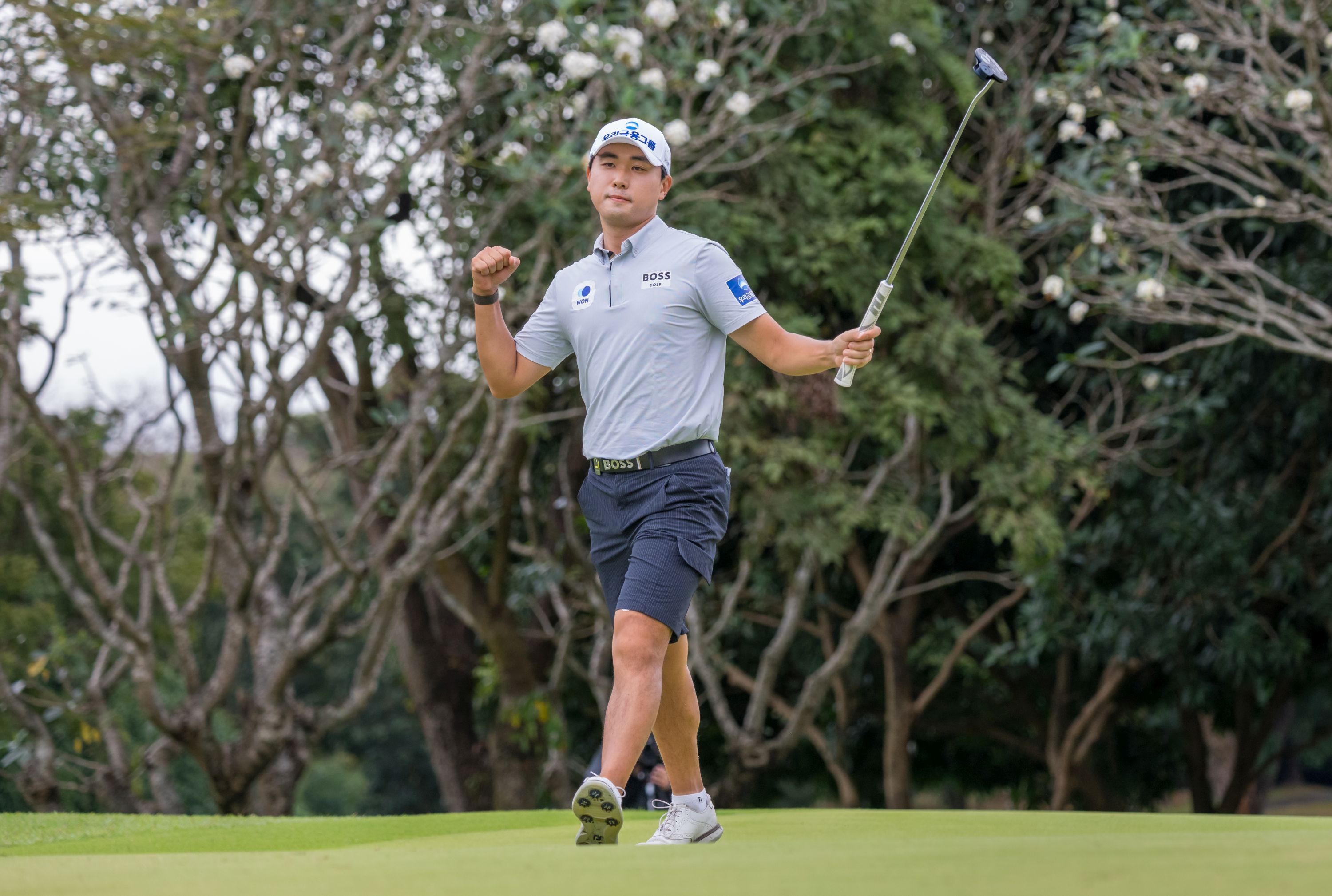





Recent Comments